

To communicate to Free Will Baptists a unifying vision of our role in the extension of God’s Kingdom






To communicate to Free Will Baptists a unifying vision of our role in the extension of God’s Kingdom



With no wasted motion, my cousin John grabbed two bundles of roofing shingles—one over each shoulder—and climbed a wobbly extension ladder two stories without using his hands, depositing the bundles on the roof like sacks of groceries. Back on the ground, he glanced over with a perfectly straight face. “Shouldn’t take you too long.”
He made it look so easy. I should have known better. It took everything I had (and more) just to keep up with the guys nailing down shingles. Three hours later, heart pounding, legs quivering, and drenched in sweat, I was the happiest guy on earth to hear those magic words, “Ready to grab some lunch?”
That first day on the construction site was one of the many times John Driggers made things look easy when they really weren’t.

As the “baby” cousin, an only child ten years younger, I looked up to John, watching him closely for cues about how to act and live. As a kid, I emulated his lopsided, mischievous smile, walked like he walked, wore my hat like he did (off to one side), and did my best to remember all his goofy one-liners to repeat to school friends.
While a young teen, I learned from John how to have fun without getting into trouble—mischief without the mayhem. Good, wholesome activities with friends and family. I also watched John struggle to find his place in life and ministry, and later it helped me through my own struggles to find a role in God’s work.
As the years passed, John led the way in so many areas. He taught me to find enjoyment in small things: flea market finds, goofy song lyrics, fun moments with the kid cousins. And generosity. I never left John’s house without a handful of bills. “Gettin’-around money,” he called it. He gave me a summer job during college then taught me what it means to work hard, really hard. (Really, really hard.)
As an adult, John showed me how to be a good husband and father (Deddy in rural South Carolina). He always managed to make time for his wife, daughter, and aging parents despite a brutal schedule as a builder/contractor and pastor. John made it look easy. Today, as a husband and father myself, I know it wasn’t.
He taught me what it means to speak the truth in love. I’ll be honest: I didn’t always enjoy (or appreciate) that part of our relationship, but I am grateful for the difference it made in my life.
Then, last October, John taught me something else. Something I really didn’t want to learn—how to finish well. Diagnosed with a rare and aggressive form of cancer days after walking his beautiful daughter down the aisle, John left this earth a month after his diagnosis. While I wasn’t with John during those hard final days, I understand his last thoughts were not for his own comfort but for his family, his work, his church, and, most importantly, his Lord. Sounds about right.
He didn’t want a funeral, just a simple graveside service followed by homemade desserts and gallons of ice cream. I think the entire county turned out, cars filling the church parking lot, packing the field beside the church, and lining the highway on either side.
Seems I wasn’t the only one who looked up to John. We are all going to miss him.
About the Columnist: Eric K. Thomsen is managing editor of ONE Magazine. Email: eric@nafwb.org.
Antioch, TN—The National Association of Free Will Baptists (NAFWB) and Child Evangelism Fellowship (CEF) entered an agreement of cooperation October 10, 2022. “We believe this cooperation will support our mutual God-given mission to take the gospel of Jesus Christ to the world,” wrote Fred Pry, CEF assistant vice president U.S.
Established by Jesse Overholtzer in 1937, CEF is a Bible-centered, worldwide organization composed of born-again believers whose purpose is to evangelize boys and girls and establish (disciple) them in the local church.

“As Free Will Baptists are dedicated to REACHING the world for Christ, TRAINING congregations to effectively
grow healthy churches and make disciples, and GIVING faithfully to support the work of the Kingdom, this cooperative relationship with CEF is a natural fit,” said NAFWB Executive Secretary Eddie Moody.
“We want our churches and ministries to know we endorse and support CEF in their work, both in the United States and around the world, and we encourage our churches to seek opportunities to work together with CEF for the purpose of the gospel and the Kingdom.”
Learn more about the history, mission, and resources CEF provides at CEFOnline.com. For more on resources from NAFWB, visit www.nafwb.org/resources.
EDITOR-IN-CHIEF: Eddie Moody MANAGING EDITOR: Eric Thomsen
ASSOCIATE EDITORS: Ken Akers, Adra Brown, David Brown, Kathy Brown, Jeff Caudill, Danny Conn, Claiborne Scott, Deborah St. Lawrence, Phyllis York
LAYOUT & DESIGN: Randall House Publications DESIGN MANAGER: Andrea Young DESIGN: Marianne Stewart PRINTING: Randall House Publications
three nights lodging
the club hotel, breakfasts, and dinner on Wednesday and Thursday. Additional player benefits include afternoon rounds for only $15, Top Golf, and a hot mineral pool spa. Spouse package available with room only (no golf). Learn more: FWBMastersMen.org.

Before he became pope in 590 AD, Gregory the Great served for a time as the apokrisarius or papal legate/representative to the emperor in Constantinople. While there, he found himself embroiled in controversies with the Patriarch of Constantinople, the chief church leader in the Eastern Empire. In one instance, the Patriarch of Constantinople gave himself the title “ecumenical patriarch,” which translates to “Bishop (or Overseer ) of the World.”

Gregory reminded the ironically named John the Faster all bishops were equal under the one true Head—Jesus Christ. Gregory believed pride was the enemy of the faith and the tool of the antichrist. His prescription was humility.
Too often as church leaders, it is easy to let pride creep in. After all, we are the ones who answer theological questions. We are the people to whom our church members come when they have a question about Scripture or about life. People look to us when a question comes up about the direction of the church. The office of the minister is indeed tasked with overseeing God’s people. But the attitude with which we conduct these efforts must always be humility. Jesus demonstrated the humility of a true leader in John 13 when He washed His disciples’ feet. Biblical leaders follow His example in washing the feet of others.
This text expresses several important principles regarding humility and leadership:
Biblical leaders humbly remember their continual need for Christ and His forgiveness (verse 10).
The Free Will Baptist Catechism notes the washing of the saint’s feet “teaches humility and reminds the believer of the necessity of a daily cleansing from sin.” Many who reject feet washing as an ordinance do so on the grounds it is unrelated to Christ’s death or our salvation. Where baptism clearly signifies our cleansing by the blood of Christ, and the bread and wine of the Lord’s Supper clearly indicate Christ’s blood and body given for us on the cross, some fail to see how washing feet compares.
I would argue that washing feet is certainly related to our ongoing salvation experience in at least two ways. First, as

Christ knelt before His disciples, He portrayed His humbling in the incarnation, becoming one of us so we might have salvation.
The second is clearly indicated in the text itself. In verse 10, Jesus told Peter the person who has been cleansed is clean and does not need to wash except for his feet. The clear implication: though we have been cleansed by the blood of Christ, as we walk through this broken world and wage war against our fallen natures, we perpetually battle sin. The same attitude that acknowledged our sin and our total inability to satisfy God’s law at conversion must continue every day of our lives. We don’t simply trust Christ once for salvation; we trust Him daily. As John reminded us in another passage, “If we say that we have no sin, we deceive ourselves, and the truth is not in us,” but “if we confess our sins, he is faithful and just to forgive us our sins, and to cleanse us from all unrighteousness” (1 John 1:8-9).
Biblical leaders need to be reminded we stand in constant need of Christ’s forgiveness in our lives, along with His power and wisdom in our ministries. As we wash one another’s feet, may we remember Christ has already washed our hearts, and as Peter said, our hands and our heads as well as our feet (John 13:9). Our lives must be bathed continually in grace and our ministry anointed continually by His mercy. Feet washing helps biblical leaders remember their continual need for Christ and His forgiveness.
Biblical leaders remember no one is beneath our service (verses 3-5).
The ordinance of feet washing helps us here as well. This principle describes what we usually mean when we refer to humility regarding this ordinance. To be a Christian is to adopt an attitude of humble service. Jesus reminded His disciples (who were constantly jockeying for greater positions in His coming Kingdom) the Kingdom of God is not about being served but about serving. Just as Jesus humbled Himself and gave His life as a ransom for many (Matthew 20:28), we are called to humble ourselves before all people and seek to serve them. Biblical leaders serve
their whole congregation. This includes those who gossip or speak poorly about us behind our backs. Jesus washed the feet of Peter the denier. He washed the feet of Judas the betrayer. He served everyone.
Biblical leaders also serve the whole community. Feet washing provides a wonderful reminder of Jesus’ entire ministry. No individual was too unholy, too sick, too broken, or too outcast to merit His attention. We all come to Jesus on our knees, and we are expected to make Jesus known on our knees through prayer and service to others. But feet washing doesn’t just remind us to serve others. It helps us see Christians need one another.
Biblical leaders remember we need one another’s help (verse 8).
It always surprises me when the most humbling part of a feet washing service is not washing another’s feet but allowing someone else to wash my own feet. Sometimes, we are like Peter—“Lord, you will never wash my feet!”— because we sense our brother is too important to serve us. I still remember the first time my mentor and renowned Free Will Baptist theologian Leroy Forlines offered to wash my feet. I was mortified. Surely, he was too good to wash my feet. But Brother Forlines didn’t think so. Other times, we get caught up in self-sufficiency and self-reliance. Something about having your feet washed by someone else humbles us. The American mantra of individualism says, “I can do this spiritual thing on my own.” This is unbiblical. Instead, we must draw strength from one another as we hold one another accountable, spurring each other on “unto love and to good works” (Hebrews 10:24). We must not forsake “the assembling of ourselves together, as the manner of some is; but exhorting one another: and so much the more, as ye see the day approaching” (Hebrews 10:25).
The author of Hebrews reminded us we are better together. The ordinance makes this clear as well. It is only as we recognize our need for Christ and for one another that we can truly begin to follow Christ’s example.
Biblical leaders remember to follow Christ’s example (verses 12-15).
Jesus allowed His feet to be washed by a sinful woman’s tears. He allowed Himself to be anointed with perfume as an act of worship. This same Jesus knelt and washed His disciples’ feet. The ordinance of washing feet is a remind-
er of our continual need for Christ in salvation and our continual need for one another in the spiritual life. We all need such service, and we are all required to serve those God puts around us, regardless of who they are, what they have done, or what they may do in the future.
Paul said, “Let this mind be in you, which was also in Christ Jesus,” that is, a mind of humility (Philippians 2:5). Biblical leaders follow Jesus’ example, having hearts of mercy to love what Jesus loved, pursuing purity to live how Jesus lived, and exhibiting obedience to suffer as the Savior suffered. As we obey Christ’s words in fulfilling this ordinance, we remind ourselves we are called to emulate Jesus in all things. He is our example. He is our salvation. He is our one true hope. In this ordinance, Jesus clearly said, “Follow me.”
Gregory chided the patriarch of Constantinople for calling himself the world’s bishop. For his part, Gregory went by a very different name. In letters and official statements, he consistently referred to himself as “servus servorum Dei,” or “servant of the servants of God.” Gregory recognized following Christ’s example begins in humility.
As Christ humbled Himself and wrapped Himself in a towel of human flesh, we also humble ourselves, realizing there is no righteousness or holiness within ourselves. As Christ knelt at the feet of His disciples, we also kneel to request His forgiveness. As Christ ministered to both His friends and His enemies, He shared an example that all are worthy of His love and of our expressions of it. When He commanded us to wash one another’s feet, He reminded us our own strength will be insufficient at times, but in these moments, His strength will be made perfect in us. Most often, He does this through His servants in the church, brothers and sisters in Christ.
When we wash one another’s feet, we unite in humility, remembering Jesus’ example of biblical leadership and committing ourselves to loving service. May this ordinance ever be an expression of our unity with Christ and with one another, of our continual need for Christ and for one another, and of our commitment to serve Christ and His world with humility and sacrifice.
George Whitefield (1714–1770) was a cross-eyed preacher. Childhood measles left his eyes out of alignment. Mockers called him Dr. Squintum. That didn’t stop him, however, from becoming perhaps the world’s greatest evangelist. Though an Oxford graduate, he relied more on heart than head.
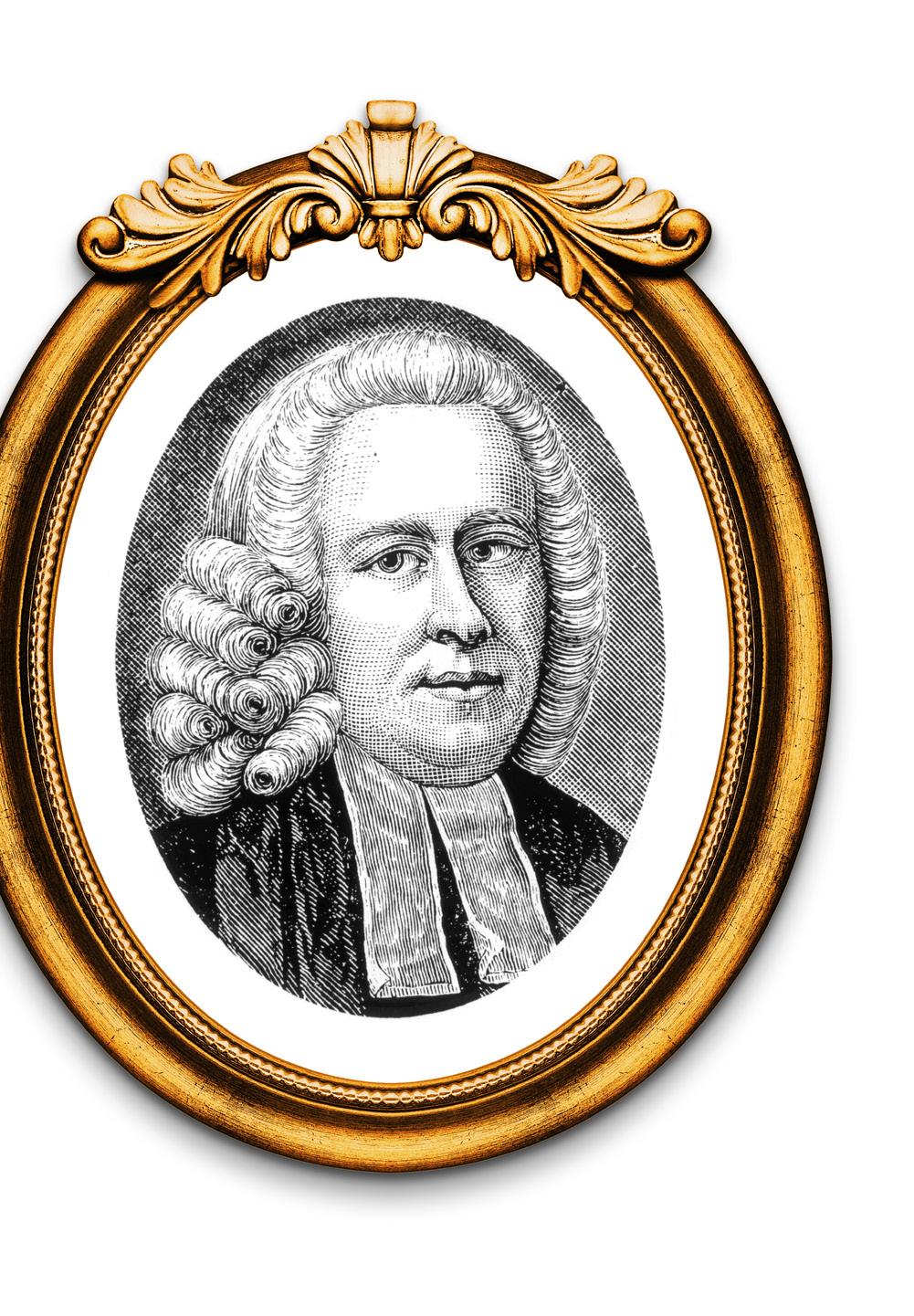
The eternal significance of preaching weighed on him. He regularly threw up before he spoke. He wept through his sermons, as did his listeners.
Whitefield often preached in the open air. A Connecticut farmer told of joining “a steady stream of horses and their riders,” hurrying to hear the evangelist. The combined hoofbeats, he said, sounded like “low rumbling thunder” and stirred up dust thick as fog. Newspapers reported Whitefield sometimes preached to thirty thousand. Not believing a voice could carry that far, Benjamin Franklin attended a sermon, did some calculations, and quickly changed his mind.
The Englishman encouraged the desperate: “There are no incurables in Christ's hospital.” He convicted the undisciplined: “If people cannot use so much self-denial as to rise early to pray, I know not how they will be able to die at a stake (if called to it) for Jesus Christ.” He challenged the apathetic: “Did He come down from Heaven, and shed His precious blood, to purchase these hearts of ours, and shall we only give Him half of them?”
Whitefield combined drama with sincerity. A prominent
actor said he’d pay a hundred guineas to be able to say “Oh!” the way Whitefield did. Others said he could make crowds weep by how he pronounced “Mesopotamia.” Along with dramatic gestures, sincerity shone through. Everyone knew Whitefield believed what he preached. This combination of gifts gripped his hearers, sometimes leading to emotional excess. His first sermon was said to have driven 15 people mad. After Whitefield referred to sinful hearts “crawling with Toads of Corruptions,” one middle-aged woman reported feeling them “crawling up my Throat.” In Scotland, a 40-year-old man confessed: “I fell under great Terror…Hell was represented to my mind, as a Pit at the foot of a Hill, and a great drove of people marching into it, and I along with them.”
Whitefield preached his last sermon September 29, 1770, dying the next day in Newburyport, Massachusetts. As requested, they buried him under the pulpit of the Presbyterian church.
He continued to preach after his death. Benjamin Randall, founder of the Free Will Baptist movement in New England, heard Whitefield three times. After a man reported the evangelist’s death. Randall wrote: “As soon as his voice reached my ears, an arrow from the quiver of the Almighty struck my heart and a mental voice louder than thunder pierced through my soul. The first thoughts that passed through my mind were: ‘Whitefield is now in Heaven and I am on the road to Hell. I shall never hear his voice anymore…He taught me the way to Heaven but I regarded it not…I would sacrifice anything to hear it again.’” Two weeks later, Randall, thinking on Whitefield’s sermons, bowed the knee to Jesus.
About the Columnist: Paul V. Harrison has pastored Madison FWB Church in Madison, Alabama since 2015. Previously, he pastored Cross Timbers FWB church in Nashville, Tennessee, for 22 years. He was an adjunct professor at Welch College for 17 years, teaching church history and Greek. Paul is the creator of Classic Sermon Index, a subscription-based online index of over 66,000 sermons, with clients including Harvard, Baylor, and Vanderbilt, among others: classicsermonindex.com.
If I polled church leaders to see if they regularly teach about stewardship, most, if not all, would answer yes. However, if they are like me when I was a pastor, that “regular teaching” looks like a yearly sermon series on the foundations of stewardship, giving, and generosity. In thinking through this subject, I wonder how effective that really is. Could it be done better and with a clearer focus?
Church leadership may need to consider seeing stewardship as part of the discipleship process. Discipleship is a journey, and each believer is at a different stage. When it comes to stewardship, the challenge comes in addressing the entire church made up of many people with various financial statuses, circumstances, and levels of maturity in their discipleship journeys.
Not everyone in our churches struggles with debt. Some have six-figure incomes; others have fixed incomes. Some have a surplus to give while others don’t have enough to pay bills. Church leaders must be sensitive to these differences and recognize their churches are comprised of people with all kinds of financial conditions and varying levels of stewardship.

One of the main reasons we need to understand this is because money can be a rival god to anyone, no matter how much or little we have. The writer of Proverbs described it like this in Proverbs 30:8-9: “Give me neither
poverty nor riches; feed me with food convenient for me: Lest I be full, and deny thee, and say, Who is the Lord? or lest I be poor, and steal, and take the name of my God in vain.”
The temptation for the wealthy is to put hope and trust in money. For those without financial resources, the temptation is to worry and fear.
When we stop and think about it, clearly, our stewardship training needs to be more than just an annual sermon campaign that hits the highlights. It needs to be an essential part of our discipleship program, focused on the entire church with its various levels of financial standing and generosity. The conversations are different for those struggling with debt versus those living paycheck to paycheck, the generous versus those who are reluctant to give. If we want our stewardship programs to be effective, we must think through these things and consider how to be relevant to all.
Each church is different. A one-size-fits-all, cookie-cutter approach won’t work. However, some simple thoughts are helpful:

• Commit to stewardship training for all.
• View stewardship through the lens of discipleship.
• Allow room for growth and grace for your people.
• Teach a biblical foundation of stewardship.
• Provide practical tools.
It is required that stewards be faithful. If every believer is a steward, it’s up to the church to help disciple its congregation towards faithful stewardship. May every church do its best to help each person in every situation move forward in their stewardship journeys and be faithful to God.
About the Author: Chris Compton is accounting administrator for the Board of Retirement. He graduated in 2007 with a M.A. in Bible exposition from Columbia International University. A 1998 graduate of East Tennessee State University, he has over 18 years of administrative/financial experience in varied fields and seven years in pastoral ministry.
Saving for retirement is not about preparing to end your work for Free Will Baptists. It is about preparing for new ministry opportunities. Planning ahead helps you prepare for the day when the paycheck stops and new horizons open. Partner with the Board of Retirement. Let us help you prepare for your future ministry.

 BY DON MATCHETT
BY DON MATCHETT
Teaching that did venture into this area likely included these statements:
• “Money is the root of all evil.”
• “You cannot serve both God and mammon.”
• “It is easier for a camel to go through the eye of a needle than for a rich man to go to Heaven.”
At such a young age, I interpreted poverty as a requirement for entrance to Heaven. And, if that were true, we were well on our way. But is this really true? Must we live the life of a pauper to find God’s favor? Is it a sin to live comfortably? Of course not! I contend God grants us wealth to accomplish His mission.
I believe we learn two main principles from Scripture concerning wealth and stewardship. First, our measure of wealth has no bearing on our salvation. Money itself is amoral. Money isn’t evil. An idolatrous posture toward money is wrong. Paul warned against this in 1 Timothy 6:10. He did not teach “evil money” but noted the idolatrous love of money brings all kinds of evil.
Second, we are responsible for managing the things God gives us. Jesus dealt with money in 16 of His 38 parables. In several of these, Jesus taught principles for handling money. Scripture addresses this subject four times more than it addresses prayer and faith. Obviously, our stewardship is a critical topic. Stewardship has taken on several meanings through the years. From a biblical perspective, a steward is entrusted with resources and must answer how wisely or unwisely he has invested. The Master distributes gifts at His discretion. We are entrusted with a portion of what God owns and are accountable to Him to manage His affairs well.
So, what has the Father entrusted to us? Not only does He bestow monetary and material things, but He also bestows talents, personal characteristics, wants and desires, and the things that make us who we are. God created us for His purpose, and it isn’t a coincidence our attributes and gifts are the tools likely to determine our role in His Kingdom. Each of us is designed for His destiny. However, if we genuinely believe in free will, we must be good stewards to accomplish His purpose for our lives. Personally, the closer I am to God, the more I desire to see His name known and the more I want His Kingdom to expand to the nations.
So, what are biblical principles of good stewardship? Here are seven to consider:
• Good stewards give their “first fruits.” While we no longer live under the Mosaic law, we learn much from the Old Testament sacrificial system. The Israelites gave their first fruits and carefully set aside the best to offer as part of their worship. My carnal side wants to offer leftovers from the forgotten part of the refrigerator.
• Good stewardship is an overflow of our commitment to Christ. I am so glad our wealth status has nothing to do with our salvation. Salvation comes from the work of Christ and our faith in Christ. However, good stewardship of God’s resources demonstrates our salvation. Our attitude toward money is indicative of our relationship with the Father and of fulfilling His purpose in our lives.
• Good stewardship strengthens our faith (Philippians 4:19). In his letter to the Philippians, Paul points out they are equal beneficiaries in their gift to support Paul. Of course, genuine giving doesn’t seek personal gain. But giving does bless both the giver and receiver. The challenge of giving by faith is one does not experience the blessing without applying
We are entrusted with a portion of what God owns and are accountable to Him to manage His affairs well.
As a child, I don’t remember many lessons and sermons about managing money.
the faith. In other words, we must genuinely step out in faith to experience the benefit.
• Good stewardship is intentional. Deciding is a deliberate practice. Good stewards carefully and prayerfully plan how to manage, use, and give their resources (2 Corinthians 9:7). I have been guilty of considering how much is in my pocket when determining how much to give. A biblical approach is to plan my giving and decide what I will give long before the offering plate is passed. Those who plan and manage their money well can be more intentional about giving.
• Good stewardship is consistent and trustworthy. Good intentions have little value until they are implemented. Consistency builds routines; routines make habits. Consistency is equally helpful to all the entities you support. Regular contributions help the church sustain current needs and operate on a budget. Missionaries need solid, faithful monthly partners. Then, when they leave the States to serve, they can feel confident in their continued funding.
• Good stewards plan beyond their own lifespan. Ralph Winter said, “Never concede to doing something so small that it could be accomplished entirely in your lifetime. Be a part of something that began before you were born and will continue onward toward the fulfillment of all God has purposed to accomplish” (Perspectives on the World Christian Movement). Wouldn’t it be fantastic if our lives affected the Great Commission well beyond our passing because we managed our finances well?
• Good stewards of God’s resources give proportionately. The principle of giving based on what we are given is a theme throughout Scripture. In the Old Testament, God tells Abraham he will be blessed to be a blessing. In the New Testament, Paul instructs readers to give to God to the extent He has blessed them (1 Corinthians 16:2, 2 Corinthians 8:3). Those to whom the Lord gives more, more is required.
The most valuable lesson we can learn is we are not owners; we are stewards who strive to please our Master through obedience. The sooner we realize this, the better. We are then released from our worries, frustrations, and unhealthy relationships with money. We must consider two questions.
First, is He Lord of all my life, or am I? How we answer this question determines how we address our time, talents, money, and possessions. A wise manager holds tightly to the eternal and lightly to things with only earthly value.
Second, what is His desire for the resources He confers to me? God’s highest priority is for every nation, tribe, people group, and language to come to the saving knowledge of Jesus Christ. Is that our highest priority?
 About the Author: Don Matchett joined the IM office team in 2017 and serves as director of development. He dedicates himself to helping missionaries, local churches, and church leaders as they partner together to fulfill the Great Commission.
About the Author: Don Matchett joined the IM office team in 2017 and serves as director of development. He dedicates himself to helping missionaries, local churches, and church leaders as they partner together to fulfill the Great Commission.
THE MOST VALUABLE LESSON WE CAN LEARN IS WE ARE NOT OWNERS; WE ARE STEWARDS WHO STRIVE TO PLEASE OUR MASTER THROUGH OBEDIENCE.
Have you ever known someone you just couldn’t “outnice?” No matter how many gifts or acts of kindness you show, they just seem to keep outdoing you. That is an apt picture of the goodness of God. We truly can’t outgive God.
As parents of adult children, it’s been interesting to watch them adjust to the realities of life on their own. Our daughter Amy recently decided she needed to step up her obedience and begin giving a tenth of her income to the Lord’s work. On a teacher’s salary, though, she had a great concern her nine-tenths just wouldn’t stretch far enough. She was already trying her best to make ends meet via several “side hustles” and creative pursuits. She really needed some things, including a couch, but it could wait. It was hard to give that first offering of $120 to her church, but she gave it anyway—not exactly joyfully, but at least obediently.
The next day, a person she hadn’t heard from for several years contacted her with an order. She wanted ten handmade rings at $12 apiece. Yep…you do the math. Amy had been blessed with the exact amount of money she had given.
That’s not the end of the story. As she looked around online, she found a used couch she really liked and sent a text to the owner. The quick reply shocked her. The seller was a friend from church, who wrote, “Amy! I will totally give that couch to you!”
Several months later, Amy was selling handmade and used items at a farmer’s market, still trying to make ends meet. A young family of six came to her booth with $20 in hand, looking for good, usable clothing. Amy learned they had recently entered the U.S. as refugees from
Afghanistan by way of Qatar. They each had the clothes they wore and one more outfit. “Keep your $20 and take everything you can use,” she told them. Since then, she has sourced children’s clothing for them and others in need within the church community. God has blessed.
The essence of the Christian life is obedience to Jesus. We may or may not be repaid with material blessings, but obedience always brings reward. “Take my life and let it be consecrated Lord to Thee.”
“Bring ye all the tithes into the storehouse, that there may be meat in mine house, and prove me now herewith, saith the LORD of hosts, if I will not open you the windows of heaven, and pour you out a blessing, that there shall not be room enough to receive it” (Malachi 3:10).
About the Author: Ruth McDonald began her role as WNAC director in November 2022. She and her husband Donnie served as missionaries in Japan for 38 years, most recently in the Good News Chapel in the greater Tokyo area. Learn more: WNAC.org.
My dad was born in 1924. A time of economic upheaval and scarcity marked his formative years. His was not a “throw away” society. Every resource was used until it absolutely could be used no more. I remember him telling me many times, “If you don’t take care of it, a $50 pocket watch will last as long as a $5 watch.” He took joy in keeping old things in good repair. That, to him, was good stewardship.
The Bible exhorts us to be good stewards, to manage the time, talents, and treasures God gives us. I believe our global partnerships provide a great opportunity to practice good stewardship as we advance the Kingdom through our more mature works.
Free Will Baptists have a long history of missionary activity. From the first modern-era missionary sent out in 1935, fulfilling the Great Commission has been a high priority. Over time, infant works mature into strong works exhibiting three selfs: self-supporting, self-governing, and self-propagating. Missionaries are no longer needed, and the national church fulfills the roles missionaries previously held.
That’s where partnerships come into play. A partnership is an agreement between the national church in countries where Free Will Baptists once had a missionary presence, or with a like-minded missionary organization. Frequently, the second scenario occurs in areas inaccessible to North American workers.
We ask these national churches and organizations, “How can we assist you in fulfilling your vision?” Assistance comes in many forms. Though often financial, assistance may also take the form of training, teaching materials, meetings, and encouragement.
At present, IM has partnership agreements with 11 partners in nine countries. Some of these partner ministries are detailed below.
One of IM’s key tasks is to train leaders who train others. Presently, we work with Bible institutes or seminaries in Bangladesh, Brazil, Central Asia, Cuba, Panama, India, Ivory Coast, Pakistan, and Russia. The fact these countries have these resources underscores their value. Degrees range from Bible worker to bachelor’s degrees. A couple offer graduate-level diplomas.
Our partners also have a strong emphasis on church planting. Recently, one of our partners in India planted 37 churches in three months. Other countries are seeing an increase in churches and groups of believers. Some of these areas are hostile to the gospel, but the church is still growing.
Our partners also believe biblically-grounded leadership is required for a growing church. Several have centers or classes for leadership development. This gives them opportunity to develop leaders with the tools to lead biblically and effectively.
The command to go to the “ends of the earth” is not just a mandate to North Americans. Our partners participate in going into all the world to spread the gospel. The Cuban church has sent missionaries to the Ivory Coast and Uru-
guay. Some of our partners send missionaries to areas and countries closed to the gospel. Due to their geographical proximity, they can reach across those borders.
Some partner countries speak many languages. Having the Bible in the heart language is a great tool for evangelism, discipleship, and growth. They initiate an effort to translate and publish the Bible in the local language. Bangladesh recently published Scripture in a language people waited 67 years to receive. Our partners in Central Asia make it a point to distribute Bibles to communities and villages. Their goal is to distribute a million Bibles before 2025.
Though these are the main areas of our partnership ministry, this list is not exhaustive. Mercy ministries are also used as outreach. In Cuba, our partners work with the forgotten elderly in nursing homes. In Panama, food distribution projects help needy children. The medical work in Ivory Coast provides quality medical treatment to the Ivorian community. Young girls in India take sewing classes to learn a marketable skill. Pakistani believers maintain care for many Afghan refugees. In Central Asia, Hope Centers give people a place to read and study the Bible.
These ministries represent years of toil, personnel, and funds. Free Will Baptists made considerable investments in the early stages of these ministries, and many of our like-minded organizations also sacrifice at personal cost and expense.
One of the best ways we can be good stewards is to ensure partner ministries continue and grow. In doing so, we honor the efforts of previous generations. Let’s take care of these ministries and support them as we labor with the Body of Christ to fulfill the Great Commission.
To find out how you can be involved, contact us: partnerships@iminc.org.
Often, I hear the question: Is family more important than church? I believe the question itself reveals unhealthy priorities. Few people ask, Is family more important than personal hygiene? Is family more important than sleep? Meals? Exercise? For that matter, Is family more important than breathing? We do not ask these questions because personal hygiene, sleep, eating, exercise, and breathing are all considered essential to life.
The Bureau of Labor and Statistics reports the average American spends 11 hours each day doing essential activities—sleeping, eating, tending to hygiene, etc. That is 77 hours each week. No sensible person sees taking a shower, eating a salad, or getting a good night’s sleep as a threat to spending time with the family, because these are essential to life.
Perhaps the main reason Christians view church as a threat to family time is because many do not regard church as an essential activity. Unfortunately, church falls into the same category as a hobby or social activity, something we do when it is convenient, but also something we are quick to cancel.
Unlike some essential activities like sleeping and personal hygiene, attending and serving your local church is an essential activity you can do with your family. Like family meals around the dinner table, you can come together each Lord’s Day to worship. Family meals do not take away from family time, nor does family worship with the gathered Body of Christ. You will find no better way to spend the first day of the week than singing together, sharing a Bible during the message, holding hands during prayer, and giving to the offering.
Worship is not the only family event at church. Serving the church is also a great way to bring the family together. Some of our sweetest family times have been spent in the church serving Christ. Each week, my wife Kimberly and I, along with our three kids, are privileged to make copies, fold worship programs, arrange music stands, move chairs, replace microphone batteries, and set up sheet music for the musicians at the church plant where we serve. We treasure these times together.
Is it possible to have too much of an essential thing? Yes. If eating keeps you from breathing, it is too much of an essential thing. If an excess amount of sleep keeps you from ever getting a shower, it is too much of an essential thing. If an excessive amount of church commitments keeps you from spending time with your family, then it is too much of an essential thing.
But keep in mind, too much time at church is not an issue for the average person. In the BLS survey referenced above, 13.4% of Americans surveyed participated in organizational, civic, and religious activities (including volunteering) for 3.5 hours each week. The remaining 86.6% reported zero time in organizational, civic, and religious activities. That’s an average of 28 minutes per week per person in the U.S. Given the fact these 28 minutes are not just church involvement, I think it is safe to say the average American Christian is not dangerously close to getting too much church.
However, let me share a word of caution. As someone who has served in both volunteer and full-time ministry, too much time at church is a constant concern for the families of ministry leaders. Many pastors’ children have been wounded by parents who could not find the appropriate balance. It is important for the pastor to lead in this and advocate for his family. Church members also need to come alongside the pastor’s family to make sure adequate time is spent together away from ministry responsibilities. This is not just a “nice” thing for churches and pastors to consider. It is essential because if a pastor cannot rightly lead his family, he is disqualified from leading the church (1 Timothy 3:4-5).
The local church is a community of redeemed people who gather regularly to worship God in spirit and truth and carry out Christ’s mission. The church is most often described in terms of local assemblies, but it is also a universal body of all believers both living and dead. Christ promised His Church will succeed: “I will build my church, and the gates of hell shall not prevail against it.” (Matthew 16:18).
Those discussing whether church is essential often turn to the familiar line “Not forsaking the assembling of ourselves together, as the manner of some is... (Hebrews 10:25)” While this is a clear command from Holy Scripture to gather with the Body of Christ, the reason for the command comes in the phrases immediately before and after it: “And let us consider one another to provoke unto love and to good works...but exhorting [encouraging] one another” (Hebrews 10:24-25). It is essential for Christians to gather to minister and be ministered unto. In reality, much of what Scripture commands the believer to do can only be done in the context of a gathered assembly. You may say, “Well, I don’t really need other Christians; my main focus is my personal walk with Jesus.” The writer of Hebrews also addresses this matter, noting individual believers no longer rely on a priest, but “enter into the holiest by the blood of Jesus, by a new and living way” (Hebrews 10:19-20). As glorious as personal, individual salvation may be, the writer of Hebrews does not see this in conflict with or as a substitute for regular meetings with the body. Verses 19-23, which immediately precede
$4,113,100
GRANTS
the “not forsake the assembly” verses, emphasize Christ’s priestly work for individual believers, followed by the clear command to gather regularly, even more as we see the Day of the Lord approaching. In short, there are no Lone-Ranger Christians! The church is essential for personal growth in Christ, for growth of your family individually and collectively, and for the mutual health of the Body of Christ (Ephesians 4:15-16).
We should not regard the church in conflict with family, any more than we regard our breathing lungs in conflict with our beating heart. Both family and church are essential. Your family needs the church, and the church needs your family. May God grant us clarity in this matter, grace when we fail, and strength to serve and worship with one another.
About the Author: Daniel Webster serves as director of enrollment and adjunct instructor of Bible and Music at Welch College. A lead pastor and associate pastor since 2003, he currently lives in Gallatin, Tennessee, with his wife Kimberly and their three children. Read more at his blog: AThingWorthDoing.com.
Antioch, TN—Since 2017, Free Will Baptist Foundation has awarded annual grants totaling more than $4 million to Free Will Baptist ministries. The grant program is funded by capturing a portion of capital gains from the Foundation’s stock portfolios.
Last year, the Foundation was fortunate to capture enough capital gains to fund $750,000 for grants before the market began to fall. This is not the case in 2023. Due to the fallen stock market and the potential to fall further before a turnaround, the Foundation cannot award grants in 2023. However, the organization is optimistic the grant program will be able to resume in 2024.
Last year set a record, as the Foundation awarded $750,000 in grants and distributed an additional $1.1 million to denominational ministries, totaling $1.85 million. Learn more about the ministry of the Foundation: fwbgifts.com.

In the 1960s, The Rolling Stones had a smash hit called “Let’s Spend the Night Together.” Considering their success, Ed Sullivan gave the Stones an opportunity to play the song on his late night television show…on one condition. He asked the band to change the lyrics from “Let’s spend the night together” to “Let’s spend some time together.” The show’s producers evidently thought the song pushed the envelope too far, and viewers would be offended. Surprisingly, the band agreed.
My, how times have changed. Today, pop music, movies, television shows, and most other forms of media offer graphic, sexually-charged content without raising an eyebrow. Not only does our culture push the envelope when it comes to sexual content, but it also screams loudly that promiscuity is normal, and no restrictions should be placed on sexual “freedom.” Today’s Christian striving to live a pure life often feels tremendous temptation to conform to this morally-crumbling culture.
While today’s sexual boundaries have been moved (or removed), the sexual boundaries in God’s Word have not changed, and they are boundaries established for our good. This is precisely what 1 Thessalonians 4:1-8 addresses: purity in relationships. Verse 3 is the key to the passage, noting our sanctification is the will of God. Sanctification is a big word we don’t use every day, but it is crucial for our everyday lives. In Scripture, when something or someone was sanctified, that item or person was set apart to God. A closely related word is holiness, which is also emphasized throughout this passage.
It is crucial to know there are dimensions to sanctification. A one-time, immediate dimension of sanctification happens when we are saved. God sets us apart from the world as His children. At this moment, He gives us the holiness of Jesus. He imputes to us (as sinners) Christ’s perfect holiness. Another dimension of sanctification is reflected in the way we live, as we bring our sinful human natures into conformity with the holiness of Christ. Here’s
an easy way to think about it: God gives us positional holiness in Christ that doesn’t change from day to day. But we must practice or live out our holiness based on our identity in Christ.
In this passage, Paul specifically targeted relational purity or, to put it negatively, urged us to abstain from sexual immorality. God designed the sexual union to take place within the context of marriage alone, and any deviation from His plan is destructive and damaging. Paul offers advice for maintaining sexual purity:
1. Maintain purity by avoidance. Not only is God’s will right (regardless of culture and time), but His will is also always best for us. This passage makes it clear it is God’s will for us to abstain from sexual immorality. Immorality is a broad term encompassing any sexual activity outside biblical marriage.
However, it is important to note sexuality is not evil and should not be considered a bad thing by Christians. God designed human sexuality, and it is a beautiful creation when expressed properly. As the designer, He knows deviation leads to destruction; thus, He commands us to abstain. This doesn’t mean occasional abstinence. I “abstain” from bread and sweets when I am trying to lose weight, but that doesn’t mean I don’t enjoy a slice of pie or a yeast roll on special occasions.
When it comes to immorality, complete abstinence is required. This is the idea communicated here: we demonstrate our sanctification, our commitment to holiness, by avoiding sexual immorality.
2. Maintain purity through self-control. God has given you a body, and what you do with your body matters. The original language in verse four reads, “that each of you know how to possess his own vessel.” In modern terms, the phrase simply urges us to keep our bodies under control. When God is in your life, you have the capacity and ability to choose to do the right things with your body. Be self-controlled.
Every year, during the college football season, a particular scene along the sidelines makes me shake my head. Some fiery head coach, full of fury and frustration, darts past the line that only the players and officials are supposed to cross. Immediately, another coach, appropriately described as the “get back coach,” grabs the head coach and pulls him back behind the line to avoid a penalty. The coach’s action sends a terrible message regarding self-control to his team. The same person who urges players to exercise self-control on the field cannot follow that advice himself. He needs someone to pull him back.
When it comes to sexuality, Christians pursuing holiness need to choose to do right to avoid crossing the line of immorality.

3. Maintain purity by not transgressing. The biblical term transgression describes going past or stepping over a God-given boundary or command. We acknowledge the vertical dimension to this: when we transgress God’s laws,
we sin against Him. However, in this case, sexual transgression additionally hurts you and others. Paul said when a person chooses immorality, that individual “defrauds” or takes advantage of the other person (verse 6). Paul followed up this statement by warning readers the Lord is the avenger. In other words, when we succumb to sexual immorality, and thus take advantage of others sexually, the Lord will bring about judgment.
In these verses, we also find three clear motivations to follow Paul’s admonition to purity:
1. God’s calling. God has not called us to impurity (verse 7), but to holiness. This calling is both personal and directional. It is personal from the standpoint that God is calling each of us personally. It is directional because the call is away from impurity toward purity and holiness, a life consecrated to God.
2. God’s Word. Throughout these verses, Paul refers to admonitions the Thessalonians had received previously (Scripture) and warns them that ignoring the message disregards God, not man. And disregarding God is serious business.
3. God’s Spirit. God has graciously given us His Holy Spirit. We have no greater gift than His abiding presence, and there is no greater intimacy and love than this. As Christians, our bodies are the temple of the Holy Spirit. He takes up residence in our lives through His abiding and indwelling presence. His presence enables us to live pure lives, despite temptations and cultural pressures.
Sexual purity is a delicate and difficult topic, but one we need to hear. If you have fallen into immorality, good news! You can experience forgiveness and cleansing. First John 1:9 reminds us, “If we confess our sins, He is faithful and just (righteous) to forgive us our sins, and to cleanse us from all unrighteousness.” Cling to those beautiful words penned by hymnwriter Charlotte Elliott: “Just as I am and waiting not to rid my soul of one dark blot. To Thee, whose blood can cleanse each spot: Oh, Lamb of God, I come.”
About the Columnist: Dr. Barry Raper is associate dean of Welch Divinity School and pastor of Bethel FWB Church near Ashland City, Tennessee.I don’t recall the first time I heard about Joe and Barbara Haas. I do remember, quite clearly, my first in-depth conversation with them. I met the Haases at a missions retreat for all Free Will Baptist missionaries on “furlough.” Lynette and I were in our final months of preparation before going to Africa as missionaries. Brother Joe was an imposing figure with a strong voice unfamiliar with whispering. Lynette, the daughter of missionary pioneers Dr. and Mrs. LaVerne Miley, spent eight years of her life overseas, most of that time in Africa. I, on the other hand, had not been out of the United States in my 27 years. Knowing we would face challenges with Lynette having cross-cultural experience and me having none, I sought all the advice I could get.
I asked Brother Joe for advice on the “how tos” of ministry and marriage. Pausing a second, he gave his special chuckle, and then delivered clear advice I’ve never forgotten and have since found accurate. “Clint, after a while, you will discover four or five things you can say that will stir up the fire in your wife. Learn those things and then commit to never saying them.”
He grinned—a crooked, dimpled smile under his wellgroomed mustache—chuckled lightly, and moved on to the next question.
Joe and Barbara answered the call to missions later in life. In 1967, they began their cross-cultural ministry journey to France. Packing their suitcases, they headed out with five kids to continue their obedient walk with Christ. While serving, and even while at language school, they exercised their gift of hospitality. When believers were the guests, it was a time of rejoicing in the goodness of God. If unbelievers sat at their table, it was an opportunity to build relationships and share the gospel as God’s Spirit opened the door.
Only eternity will reveal the number of people who sat around the Haases’ dinner table and either were introduced to Jesus as Savior, accepted Him as Savior, or were discipled as followers of Christ.
As rookie missionaries learning French, Lynette, our two boys, and I were far from our parents and family. We knew Christmas would be a lonely time. The Haases
understood that sentiment well. In their kindness, and exercising their spiritual giftedness, they invited us into their home for the week of Christmas break. We enjoyed plenty of fun, food, and “family” festivities. Although it was not our home, I can say without hesitation they made us feel at home. I told them many times just how special that Christmas season was for us.
A gentle man with a humble spirit, Brother Joe made people feel at ease. Always one for pranks, jokes, and the joy of living, he found much to smile and laugh about in his day-to-day life. During our week with them, he kept us laughing with his jokes and stories.
I recall one humorous story he shared about language learning. Early in language school, he learned how much smarter animals are than people. A neighborhood dog settled on the sidewalk in front of their house and barked continuously. Brother Joe made several trips to the steps, scolding the dog in an attempt to stop its irritating noise. He tried such common-sense commands as “shut up,” “stop it,” and “go away”—all to no avail. Eventually, a French neighbor lady opened her front door and yelled at the dog. Immediately, the dog stopped barking and went on its way. Brother Joe said he felt really dumb at that point because the dog understood French better than he did. He chuckled and went on to another story. Brother Joe was a man with a million stories wrapped around his love for life itself and a heart-felt passion for winning souls for Christ. A good storyteller, he always left us laughing, crying, or pondering.
He never wavered from his passion to follow Christ and lead others to do the same. Throughout his 15 years in the pastorate, 20 years as a missionary in France, 15 years at Southeastern FWB College (as missions department chair and promotional director), and into retirement, he believed and lived “to obey is better than sacrifice, and to hearken than the fat of rams” (1 Samuel 15:22b).
If I’ve ever seen a soul-winner’s heart, it was in the life and ministry of Joe Haas. He was a faithful servant until his last breath when God called him home. Now, he sees and knows even more clearly the Christ he loved, lived for, and gave his life to serve.
Have you heard this saying? “An employer will pay employees just enough to prevent them from quitting, while employees work just hard enough not to be fired.”

Could this really occur in a church? Hopefully not, but we live in a different day. Quiet quitting and quiet firing both produce a quiet church. What is a quiet church? One the surrounding community barely knows exists. The members have no excitement or anticipation, and the pastor has stopped offering initiatives.
Two business publications recently highlighted the trends of quiet quitting and quiet firing. The lessons and insights from these articles can help churches identify and correct negative congregational cultures. Inc. Magazine (September 2022) described quiet quitting as employees who lose meaning in their careers, purposefully disengage, and view their job as a means to an end. Studies show workers fall into three categories: those who find status or selfworth in their jobs, those who see their jobs as the way to provide for their families, and those who see their jobs as a calling. Interestingly, Inc. described "calling" as a clergy category.
As pastors, which of these categories describes your ministry over the last two years? Do you pastor because the role gives you worth, a paycheck, or a calling? Obviously, the calling is why most enter the ministry, but quiet quitting assigns your worth to your job. Quiet quitting is not laziness but finding easy distractions to take you off task.
Do you spend more time online (during your business day) than engaged in mission-critical items? Does your personal world eat up the hours in your workday? Do you reach the end of the day or week struggling to finish necessary items because you gravitated to non-essentials? Do you lack the desire to put in the extra time you once did? If some of these apply, you might be quiet quitting without even knowing it.
On the other hand, The Harvard Business Review (November 2022) noted employers sometimes create conditions that drive employees to resign rather than letting them go. Such actions by employers, according to HBR, include
changing job descriptions, demoting, giving employees undesirable responsibilities, not allowing them new opportunities, cutting pay, and not providing raises or bonuses. Deacon boards and smaller churches, have you used similar tactics to drive away your pastor instead of having an honest conversation?
Neither quiet quitting nor quiet firing is biblical. God’s Word says a worker is worthy of his hire (an appropriate paycheck), and workers should not be sluggards. A pastor’s call means his work is more than a job; it’s an inspired investment, even when not reciprocated. Churches, while you expect your pastor to give his all, you should do the same through support, volunteering, and providing for his family.
We need less quiet quitting and more emphasis on higher callings. Churches, champion your pastors as they champion your congregation.







About the Columnist: Ron Hunter Jr. has a Ph.D. in leadership and is CEO of Randall House & D6 Family Ministry. You may contact him at ron.hunter@randallhouse.com.
Colossians 3:23
1 Timothy 5:18 Deuteronomy 24:14-15
Proverbs 13:4 ARTICLES
www.inc.com/ jessica-stillman/ quiet-quittinghiring-engagement. html
hbr.org/2022/11/ are-you-beingquiet-fired
Hokkaido, Japan— IM missionaries joined Japanese believers in Hokkaido, Japan, for the Japan Free Will Baptist national association meetings October 10-11. The Kettemans summarized the time: “We met many Japanese pillars in our denomination, heard challenging messages, made new friends, ate yummy food, and honored the McDonalds for their decades of faithful service!”
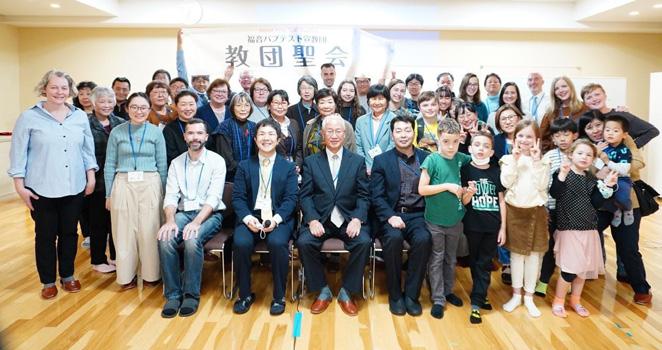
Bangladesh— Free Will Baptist affiliates in Bangladesh report they baptized 110 people and established three new churches. Once believers are baptized, the group is recognized as a church. A translation of the New Testament into the Mruchow language went to print at the end of 2022. This ethnic group is looking forward to the dedication of the Scriptures in their heart language.
La Haie Fouassière, France— November 27, 2022, Mosaic FWB Church was full as Ophélie shared her testimony before friends and family prior to her baptism. Lydie Teague said, “The Christians in the room were clearly outnumbered. Many were moved by Ophélie’s testimony.”
Rivera, Uruguay— November 20, 2022, Jaimie and Tammy Lancaster and Kenneth Eagleton
participated in discussions with Uruguayan church leaders as they considered necessary steps to formalize a partnership between the Uruguayan church and IM.
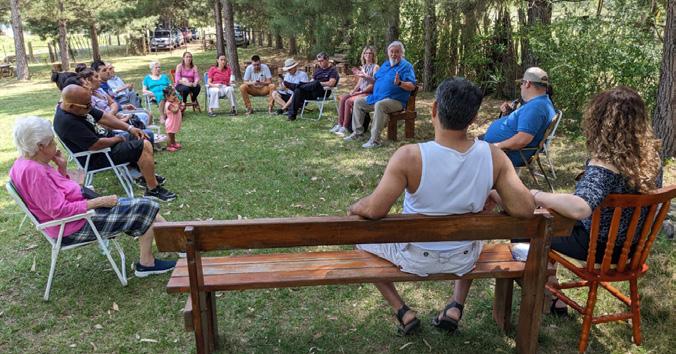
St. Nazaire, France—Valentin and Jean shared their testimonies at church on September 25. After the service, everyone adjourned to the beach to witness their baptisms.

Tokorozawa, Japan—
Three people, including missionary kid Carter Ketteman, followed the Lord in baptism Sunday, October 23, 2022, at Hope Alive church.

Côte d’Ivoire—The Ivory Coast association, touched by the destruction Hurricane Ian wreaked in Cuba, received and sent an offering of $1,605 toward the relief effort.
Panama— On October 29, three Panamanians departed for Cuba with suitcases filled with food, medicine, and other supplies to aid relief efforts in Cuba as they continue to recover from Hurricane Ian.


Brazil—The First FWB Church in Ribeirão Preto, Brazil, baptized 12 people in November. John Poole pastors.
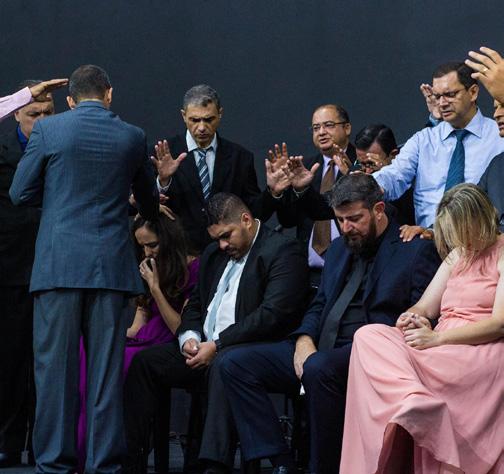
Pakistan— In October, Pakistani partners reported 30 baptisms, the fruit of evangelism and discipleship.
Jaboticabal, Brazil— The Free Will Baptist church in Jaboticabal ordained members Lude Handel and Tiago Trevisan for pastoral ministry November 19, 2022.
Antioch, TN—The IM Board met December 5-6, 2022. Some members joined via Zoom. In their time together, the board repeatedly expressed joy as they appointed new missionaries, created unprecedented ministry endeavors, and received highlights of current global efforts.
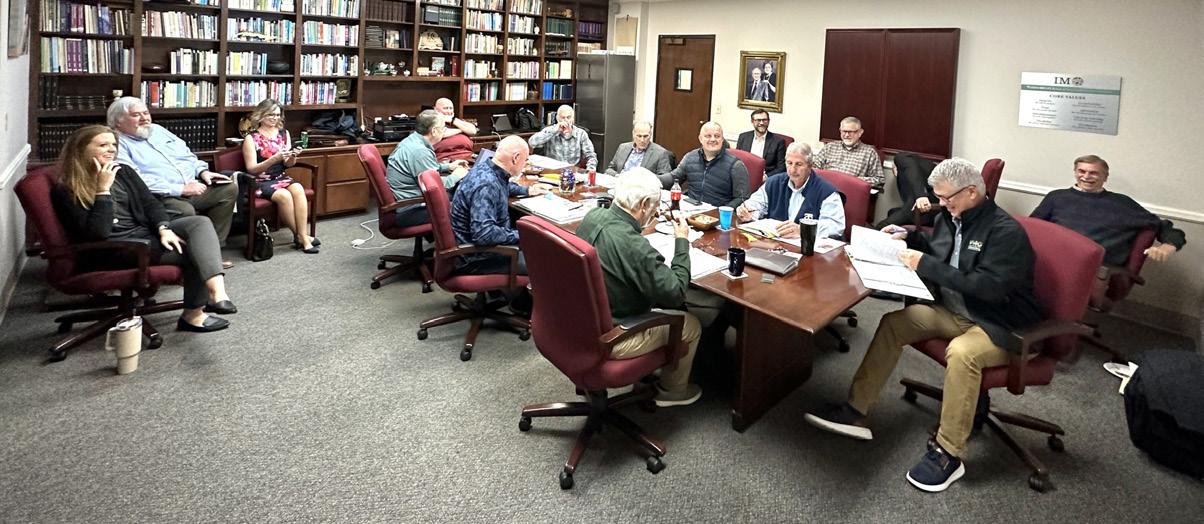
Neil Gilliland, retiring director of mobilization, rejoiced, “As we step into this season of joy, the Father continues to call people to His service. Free Will Baptist young people continue to respond to His call to reach beyond the borders of the United States. Be encouraged!”
The board approved five new intern missionaries to serve two-year terms: Bradley Mercer (Fuquay-Varina, North Carolina): international students at the University of Missouri; Callie Stox (Greenville, North Carolina): Hope Alive team, Tokyo, Japan; Tristen and Sierra White (Owasso, Oklahoma): Hope Alive team, Tokyo, Japan; and Jace Dixon (Haskell, Oklahoma): Nantes, France.
“IM’s internship program has proven a great success,” attested IM Director Clint Morgan. “The vast majority of those who go through the two-year internship have made long-term career commitments. We are truly thankful for the amazingly gifted and committed people God is sending to serve with IM.”
After completing their internships, Keren Delgado, originally from Cuba, was appointed to minister in Madrid, Spain; and Jonathan and Michelle Chereau, national missionaries in France, will return to France as church planters.
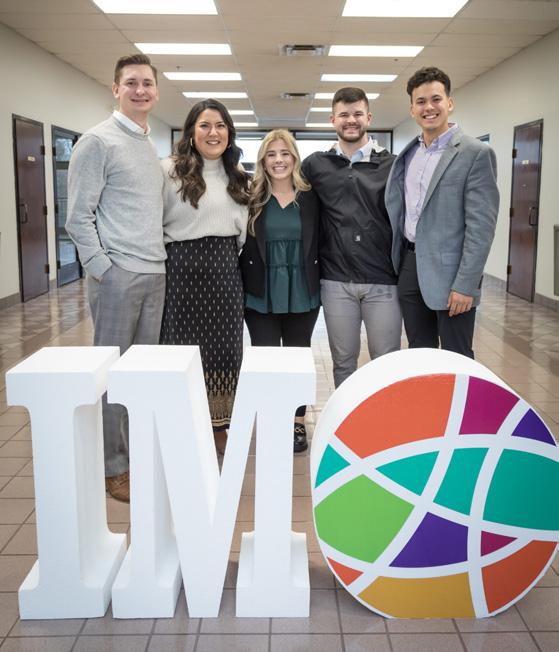
Alpedrete, Spain— October 30, Alpedrete church members witnessed the baptism of a 17-year-old young lady. Though she grew up in the church, she testified she had allowed herself to become “anesthetized” to the things of God by giving her time and attention to social media and other influences. God patiently continued to speak to her.
Anthony Edgmon said, “Many hearts were touched by this testimony. Please continue to pray for V as she grows in Christ. Pray also for the unbelievers, new believers, youth, and adults who heard God’s Word through her testimony.”
Jaimie and Tammy Lancaster submitted their resignations as missionaries after serving faithfully in Uruguay. Jaimie will continue with IM as assistant director of field partnerships, assisting Dr. Kenneth Eagleton.
Ruth McDonald ’s resignation was received as she began her new ministry as the director of WNAC. Donnie McDonald, continuing as an IM missionary, will serve as the field ministry personnel associate, working alongside Curt Holland.
The board adopted an operational budget of $8.8 million and an all-inclusive budget of $14.75 million including IMpact and other specific projects.
Pakistan— November 14, two attackers targeted a group of Free Will Baptist believers. Four men were injured by gunfire. Though no injuries were life-threatening, Kenneth Eagleton urged, “Please pray for boldness for believers in South Asia who face persecution for their faith.”
Villanueva de la Torre, Spain— Mandi Morgan wrote, “After several years of waiting and praying, God answered our prayers for a physical location for our church! Praise the Lord with us for His goodness and His provision.” The rented building became home to a new church plant December 1, 2022.
Originally called the Board of Superannuation, the Board of Retirement was established when the National Association came together in 1935. The organization’s constitution and by-laws were not approved until 1943, and participation grew slowly the following decade, with 57 participants in the “Endowment-at-Age-70” plan by 1954.
Originally called the Board of Superannuation, the Board of Retirement was established when the National Association came together in 1935. The organization’s constitution and by-laws were not approved until 1943, and participation grew slowly the following decade, with 57 participants in the “Endowment-at-Age-70” plan by 1954.
A year later, the board hired K.V. Shutes as the first full-time director. Shutes served in the position only two years before going to be with the Lord. However, his wife Lora Shutes (pictured, right) continued as the secretary/treasurer of the Board 14 years, until 1969. Only the Lord knows the difference these two servants have made for others who serve the Lord and the denomination.
A year later, the board hired K.V. Shutes as the first full-time director. Shutes served in the position only two years before going to be with the Lord. However, his wife Lora Shutes (pictured, right) continued as the secretary/treasurer of the Board 14 years, until 1969. Only the Lord knows the difference these two servants have made for others who serve the Lord and the denomination.
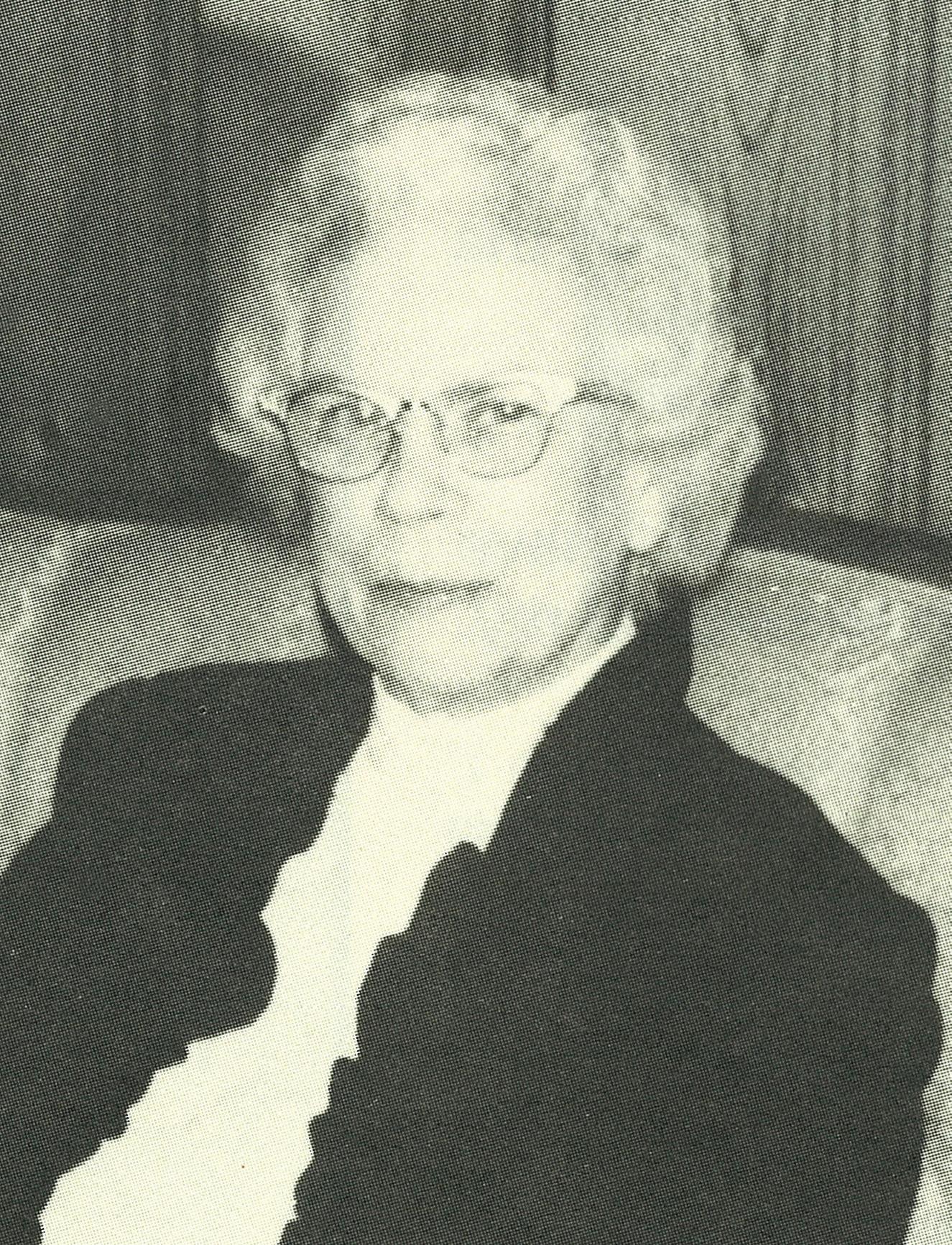

Why not leave your own gracious legacy to help pastors through a Free Will Baptist Foundation endowment?
Why not leave your own gracious legacy to help pastors through a Free Will Baptist Foundation endowment?

Free Will Baptist Foundation
877-336-7575 | www.fwbgifts.com
Free Will Baptist Foundation
877-336-7575 | www.fwbgifts.com
In the summer of 2021, my wife Darla and I moved from Savannah, Georgia, to the National Training Center in Fort Irwin, California. We started west in June, and with each passing mile, the trees grew shorter and the grass sparser. The shades of landscape changed from green to brown. In the army, you are told where to go, and our new duty destination was the high desert.
The National Training Center, the army’s premier land battle training center with over 642,000 acres of training area, is roughly the size of Rhode Island. We train up to ten 4,500-member Armored Brigade Combat Teams (ABCT) each year, in addition to Special Operations, Rangers, Aviation, Sustainment and other enabling forces. The base is located 37 miles north of I-15 and just south of Death Valley. Fort Irwin has been described as the “largest cul-de-sac at the end of the longest driveway.” To put the vast size of the base into perspective, we are 37 miles from the nearest Walmart. Images of Moses and the Children of Israel in the wilderness readily come to mind.
Upon arrival at Fort Irwin, most spouses have a moment of reckoning with reality. Picture miles of desert ascending to the post’s gate at the crest of a mountain. Through the gate and down the other side, you gaze off into a valley

with nothing but dry, brown, arid, inhospitable desolation. This would be our home for the next two years.

Our first Sunday’s chapel was less than inspiring. The day was hot, with the temperature hovering around 100 degrees. Winds were still, and it was dry and barren. The chaplain spoke from Matthew about Christ feeding His people. The text in the ESV describes the place as “desolate” (Matthew 14:13, 15; 15:33). Desolate was how Darla and I felt. Far from home, family, and the lifestyle we had come to know and love, we found ourselves in a place of isolation, desolation, and barrenness.
We soon learned nothing grows without water in the high desert of the Mojave. Nothing we had learned about gardening in the Midwest and East prepared us for temperatures above 115 degrees and frequent winds of 40-plus miles per hour. Grass grows only where sprinklers provide life-giving nourishment; where there is no water, you find only desert.
Fast forward a few months. God proved Himself in numerous ways in the middle of our desolation. As the senior chaplain trainer, my team and I had the privilege to observe, coach, and train chaplain sections to prepare for deployment oversees. Each day as we trained, we were
reminded of the grave importance of chaplains and their assistants who live with, train with, and are embedded with troops as they go to battle.
Not long after our arrival at Fort Irwin, the commanding general appointed me senior pastor of the chapel. Fort Irwin only has one chapel, and all religious support, education, and training happens at one location. Since the post is so remote, our congregation consists of all Protestant believers. As Darla and I assumed our new role, we were reminded of Numbers 20:5: “neither is there any water to drink.” The congregation was scattered, desperate, and small, without children’s programs, adult ministry, women’s ministry, good music, and direction. Into this barren place stepped a Free Will Baptist chaplain with ideas to build a congregation.
At other posts, God placed us in situations where we could build a team of chaplains and committed volunteers to create a space and time for worship, biblical preaching, connection, and fellowship. We began a plan to do the same here, and God abundantly provided. We went from a floundering congregation to a vibrant, growing fellowship. We identified strong volunteers to begin children’s ministry, and as the congregation grew, so did the ministries. Only one of our members happens to be from a Free Will Baptist church. She comes from North Carolina. The rest are as the army describes them, “General Protestant.”
Our people are committed and generous, hungry for deep biblical teaching, and amazingly receptive to the gospel. We have seen people won to Christ and baptized, and families have offered their homes for Bible studies we call Life Groups in neighborhoods across the post.
How does this work? On Wednesday, at 3:30 p.m., a handful of chaplains are hard at work, praying, planning, and discussing Scripture in preparation for Sunday. This team currently represents men from several denominations. Each chaplain oversees a ministry and, by extension, shepherds a leadership team of soldiers and families in women’s ministry, fellowship teams, children’s ministry, nursery, Bible studies, and more.
• The chapel is a place of nourishment. On most installations, the chapel can be seen for miles. As one of the larger buildings and topped with a steeple, the chapel can (and should) be the hub of all religious activity. At Fort Irwin, our service is called the Oasis Worship Experience. In this place of arid desolation,
our team provides life-sustaining nourishment from God’s Word. When you live in the desert, stories of refreshment remind you of God’s intervening power. We see this chapel—the Oasis—providing nourishment for the Body of Christ.
• The chapel is a place of connection. We regularly have guests who are disenchanted with the local church for various reasons. Perhaps they quit a fellowship due to a personal problem or were offended by a pharisaic leader. Perhaps their faith journey is just beginning, and the chapel offers a safe place. We welcome everyone, and as they learn, they are challenged by God’s Word. We are privileged to minister to their needs.
• The chapel is a place of worship. Over the years, people have asked about a chaplain’s ability to exercise faith according to denominational preference. I have been asked if the gospel is watered down, or if we can preach the truth. In all my years of chaplaincy, my freedom to exercise my faith as a Free Will Baptist has never been restricted, nor have I felt pressured not to preach the truth. The chapel offers the opportunity for like-minded people of faith to gather and to influence the military with the Kingdom agenda, with no apology for the power of the Sacred Text.
• The chapel is a place of service. Just like a civilianled worship experience, we need teachers for children’s church and AWANA, greeters, ushers, singers, and musicians. In many cases, the army chapel operates just like your local church, where the gifts of the Spirit are exercised, and the entire family grows together in the faith.
At the Oasis Worship Experience at Fort Irwin, we long to see soldiers and families connect with God, hear biblical preaching, enjoy vibrant worship, and become more like Christ through salvation and service. Weekly, we watch God water this desert by nourishing His people through the work of the Holy Spirit. Here, they find spiritual water in a barren place.
 BY BRAD RANSOM
BY BRAD RANSOM
The Great Commission is clear. We are to “go and tell” to make disciples of all nations. What if we go and tell, but in the wrong language? Immediately, we recognize the problem with this. What good would it do to present the gospel in English (the only language I speak) to someone who only speaks German?
Sharing the gospel is more than just sharing the message. We must present it in a way the listener can understand and act upon. Language is the big issue we consider, but what if an even bigger issue hinders people from understanding the gospel? I believe worldview is that second obstacle.
Worldview is the lens by which we see and interpret messages and events around us, usually specific to the culture we know. If you share the gospel from your worldview with those from a different worldview, can they understand the message? More importantly, does it resonate with them enough to act upon it?
Communicating the gospel effectively begins with understanding four main motivations/values driven by worldview:
• Guilt/Innocence
• Honor/Shame
• Fear/Power
• Indifference/Belonging
These values are based on certain geographical boundaries. For instance, in the West, where we value individualism and rights, morality is based on right and wrong as defined by law. You have the right to your own opinion and beliefs if you don’t break the law. If you do break the law, the only solution is to suffer punishment according to your crime. Most Western countries are searching for the solution to guilt.
The Middle East and Asia operate differently. Family and community are valued above everything else. Personal relationships, reputation, and social status are the primary motivators. If you come from a good family, do good things in the community, and follow social norms, you have societal honor. However, if someone does something dishonorable or experiences something dishonorable, the family and community are shamed along with the individual. It is natural for these cultures to do anything possible to avoid shame.
Latin America, sub-Saharan Africa, and many other tribal areas operate differently still. Reality is built on the spiritual realm as much as the physical realm. Their decisions hinge on the perceived positive or negative reactions from the spirits around them. Taboos, superstitions, spells, and sacrifices dominate these cultures and lead to a constant state of fear.
Since the entrance of the post-modern era (specifically in the U.S.), a fourth worldview has greatly impacted the West and other cultures. In a culture where most people believe in God but do not associate the gospel with biblical truth, we find a culture of indifferent people. They
spend their time trying to be good citizens without concern regarding sin or truth because truth only exists in the mind of the individual. These people, as identified by John Stott, yearn for three things: community, significance, and transcendence.
Community is the perception everyone belongs to a family, even in a very broken world. Significance is the desire to have a purpose in this world. They desire meaning and significance. Transcendence is a connection to something beyond immediate and material things and beings.
As we are “going and telling,” what is the good news to each of these worldviews? From a guilt/innocence perspective, good news is finding the way to pay the penalty for our sin after we are found guilty. Jesus, by His death on the cross, took our guilt and declared us innocent. Therefore, we can spend eternity in Heaven.
From the honor/shame perspective, the good news is hearing we have a Savior who took our sin upon Himself, setting us free from the shame of our sin. One day, we will stand before our Judge free from shame.
For the fear/power perspective, good news is knowing we can accept a Savior who has authority over the universe. He can calm the sea, heal the sick, and raise the dead. That Savior has all power to remove our sin and heal us from our infirmities, leaving us with no reason to fear.
Good news to those struggling with indifference/belonging comes in knowing we can be adopted into the Family of God. We have a Heavenly Father who made us heirs to His Kingdom, and we have a family (the church) with whom we identify. Because of this family, we can do greater things together than we can alone.
Yes, we are commanded to “go and tell,” but we must share the gospel in a way the listener can understand and accept the message.
Much of the information above was adapted from “3D Gospel—guilt innocence, honor shame, fear power worldviews” (https://www.youtube.com/ watch?v=n2XNoAFtqOw) and Effective Intercultural Evangelism by W. Jay Moon and W. Bud Simon.
About the Columnist: Dr. Brad Ransom is director of church planting and chief training officer for North American Ministries. Contact Brad: brad@nafwb.org.

If you are like me, in church most of your life, you are familiar with Acts 1:8 and Matthew 28:18-20. If fact, you have probably memorized these verses, commonly described as the Great Commission, at some time or another. The problem with us humans is when something is familiar, we often forget the reason it is used so often.
When I came to northern Virginia (Greater Washington, D.C.), God returned my heart to those verses. I had often preached about taking the gospel to the lost world, but suddenly, I discovered the world had come to me! All those “foreign” people from my sermons over the years were at my front door; all I had to do to reach them was go into my own community.
When God opened my eyes to this reality, I was overwhelmed. I didn’t know what to do. Our community had people from every corner of the world. However, most of them had not assimilated into American culture enough to be comfortable in our church. While we are a diverse church, most cultures prefer their own culture when worshiping, especially their own language.

I began to pray for God to open doors. I talked with Paul Park who tried to work out a situation with a Korean pastor. That didn’t work out. I discussed the situation with Earl Hendrix, who told me about the Hispanic Institute at his church in South Carolina. I even spoke with Rick Bowling about my burden for reaching the world at my doorstep, but, still, nothing happened. Then, one day Rick called out of the blue and said, “I’ve got your man!”
Isn’t it crazy how when God answers prayer we are still unprepared?
Well, off I went to South Carolina, still wondering what plans God had, and if Rick really had found the right person to work with our church. From the moment I met Diego Cueva and his family, I knew God had truly answered prayer. To make a long story short, God brought this wonderful family to northern Virginia, and with the help of the Virginia State Mission Board, our cross-cultural work began. I really can’t tell you everything we did. I had no idea what to do with a man who barely spoke enough English to get by, and who was setting out to do something I had never experienced before. We did a lot of praying!
As a little group of Hispanic people (mostly Central American) started coming together, I began to see what God wanted and why. We were on our way, but I still knew that if God didn’t do it, it wouldn’t get done. Twelve years have passed, and we haven’t gone without problems. From sound system to schedules, we had to get to know people who were not used to us or our way of doing things. We got used to loud music and people who really enjoy enthusiastic worship. We learned how to approach them and love them, despite our differences. Through it all, God performed some of the greatest miracles you could imagine. I learned our Hispanic brothers and sisters really believe in prayer. “We just pray, preacher,” Diego would say. “God do it.”
And he was right! People began getting saved and baptized. Some returned to their countries and started Free Will Baptist churches. Others brought their families and saw them saved. And as they grew, the English-speaking congregation grew. God began to bless because Parkway Church (formerly Bethel) opened its doors to the world that came to us.
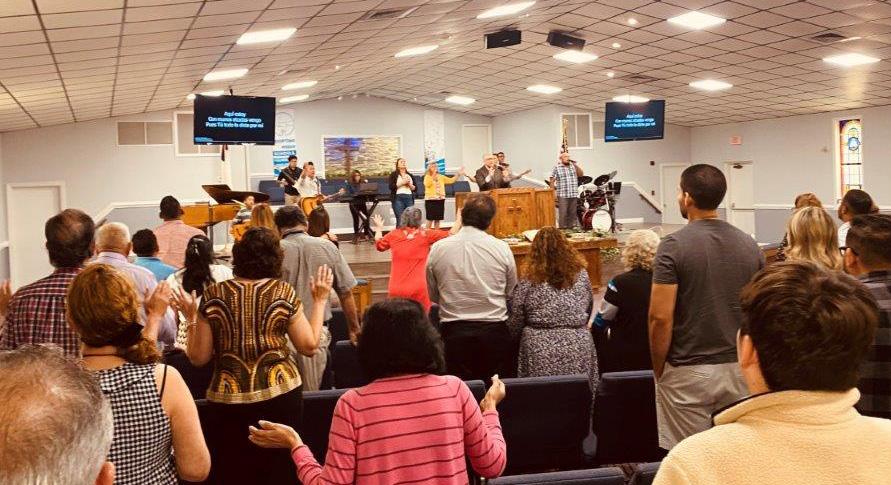
What else could we do? As the years have passed, more people from every country in the world have arrived in this area where the nation’s capital is the primary employer. We get to share the gospel story with people from the “uttermost part of the earth” without leaving our own city.
For those wrestling with the idea of having a Hispanic pastor start a congregation in cooperation with your church, I recommend it. Yes, there are challenges to consider. Yes, there will be problems. Yes, you will learn to pray as never before. But, it has been one of the greatest blessings for our church, and I believe it will be for your church as well.
1. Be sure you and the Hispanic pastor can communicate. If one of you is not bilingual to some degree, communication will become a major problem. You must communicate your questions and answer his. You must be able to reach an agreement in problematic areas.
2. Make sure your English-speaking congregation is on board. Your goal is to add members, not lose the ones you have and replace them with another congregation. This may take some teaching and training from Scripture. Don’t worry, the ones who love the Lord and have a heart for souls will be with you. Help them bring along the ones less excited about the idea. It must be a joint effort by the leaders of your church, not just the pastor.
3. When you find a Hispanic pastor who is the right fit for your church, sit down with him and spell out clearly what you expect. Make sure he understands! Ask about his goals and how you can work together to accomplish God’s work.
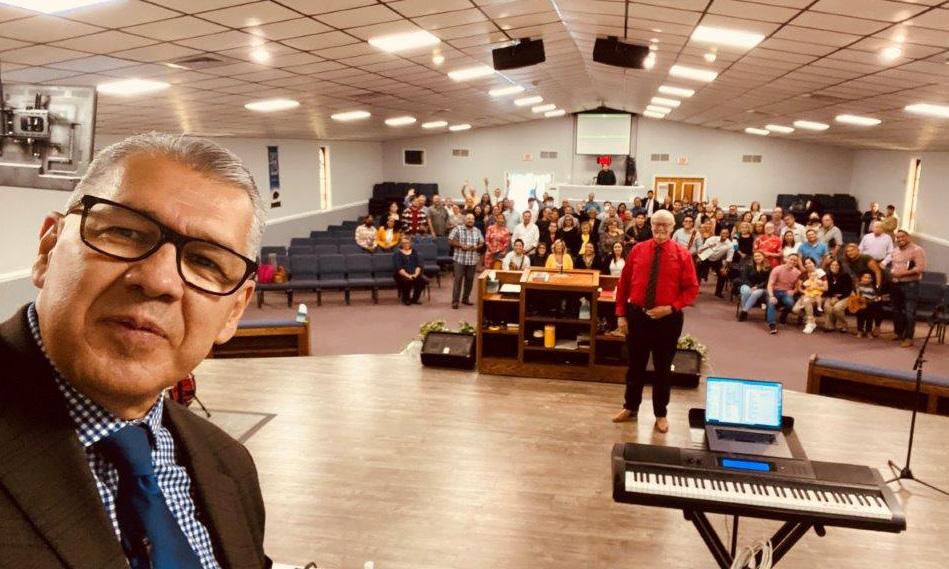
4. Expect problems. Don’t panic when the first difficulty arises but work it out with your fellow pastor. If he has a heart for God, as you do, he will gladly work out a means to accomplish the goal.
5. When the need arises, don’t be afraid to dialogue with the Hispanic congregation. You and the pastor should talk to them together. They are people who love Jesus, too. If you can talk to them (in a loving way, showing them the respect they deserve) and help them understand, you will gain their confidence. This is the way to handle problems.
6. Treat them as God’s precious children, as certainly they are. Do not talk down to them or treat them as if they are invading your territory. Instead, listen to them and help them assimilate into your church, as well as their new country.
7. All of this is based on God’s direction. I might suggest the possibility of having joint prayer times with the Hispanic pastor and your leaders. As the church grows, include some of the Hispanic leaders. It took us years to build the relationships we enjoy now. It doesn’t happen overnight. Respecting them as equals in Jesus will go a long way. The reward of souls won to Jesus, both Hispanic and English-speaking, is well worth the effort involved in partnering with a cross-cultural church. Remember the old saying, “No pain, no gain!” As soldiers of the cross, we must use every tool God gives us to defeat the devil. And this is a great opportunity.
It is my vision to have multiple ethnic services reaching more of the world that has come to us. For now, God has opened this door. Who knows what doors He will open in the future?
About the Author: Dr. Dave Nobles is pastor emeritus at Parkway FWB Church in Woodbridge, Virginia. Ordained in 1964, he has pastored churches in New Mexico, North Carolina, South Carolina, and Virginia. He holds a B.A. from Welch College and a M.Div. and Th.D. from Covington Theological Seminary.
Sometimes, I take my husband out for breakfast just because I’m nice, or because I don’t want to cook, or because it’s almost Valentine’s Day.
When I say, “I take my husband out,” I mean I pay. But saying I pay is a little off target because while there are two checkbooks—mine and his—all the money comes out of the same cookie jar.
Back to breakfast. As I said, it was almost Valentine’s Day, and our server brought menus and coffee. We glanced through the thousand (more or less) menu temptations. I lifted my cup to sip my first black caffeine of the day. Half an inch inside my cup, a dark ring-shaped design caught my eye. Strange design for a cup, I thought. I rubbed my finger over the design. It smudged. No design at all—just crud. Dried, unadulterated crud.
I pushed the cup toward the server and pointed inside.
“It’s only dried coffee,” she quipped with a shrug.
“But it’s not my dried coffee,” I replied.

“I’ll get you another cup,” she whispered and whisked the dirty mug away.
Bill and I chatted on, laughing about “It’s only dried coffee.” We decided her four words could get her fired, or at least reprimanded if her manager heard. But we weren’t
telling. It was almost Valentine’s Day, a day of love and happiness, and we were in no mood to mess it up for either her or her manager.
We selected vegetable omelets and a side of pancakes slathered in slippery butter and floating in fake maple syrup. We also talked (mostly with our mouths full) about how often our words are flippant or dismissive or deceptive, even about serious things like sin. Not that our server sinned when she said, “It’s only dried coffee.” Not at all. But she was flippant. Some other customer’s crud in my coffee cup didn’t mean much to her, so she shrugged it off like we sometimes shrug and divert attention when we sin. We may even take it farther and deny, make excuses, create alibis, or conjure artful dodgings. Who likes to admit bad things or feel guilty?
Truth is, as Madeleine L’Engle says in Walking on Water: Reflections on Faith and Art, sin is an unpopular word, and we try to avoid talking about it when it is our sin:
“The worse things get, the more we try to rationalize and alibi. When we do wrong, we try to fool ourselves (and others) that it is because our actions and reactions have been coded into our genetic pattern at the moment of conception. Or our mothers didn’t under-
stand us. Or they understood us too well. Or it is the fault of society. Certainly, it is never our fault.”
L’Engle called these rationalizations and alibis “dirty devices” we invent to exempt ourselves from the responsibility of our sin. Rationalizing shifts the blame off me. So, I don’t admit, “Yes, I did this.” I don’t say, “I’m sorry, Lord. I’ve sinned; please forgive me.” I don’t confess. I don’t make reparations. I rationalize or make alibis.

Until I read L’Engle’s comment, I’d never thought that I had alibied to deflect guilt. Alibi originated from Latin in the mid-1700s and meant elsewhere —still does, for example, when used in court. But these days and more informally, as a verb, it means “to make excuses.” Sometimes, I hedge and evade and deny as if the sin could not possibly be mine, as if I were not there, so I couldn’t have done it. L’Engle is tough on alibis: “Our sins defeat us unless we are willing to recognize them, confess them, and become healed and whole and holy.”
The blunt excuses we conjure up are dirty devices also. How well we remember Moses’ evasive strategies at the burning bush in Exodus 3-4. God called him to go to Egypt and lead the Hebrew people out of Pharaoh’s grueling slavery. Moses didn’t openly rebel or flatly say no. Instead, he contrived five excuses to absolve himself of the obligation.
Were his excuses a sin? Opinions vary on that. All five may have had some validity. But, at the least, Moses was trying to avoid God’s call to go and confront Pharaoh. He was unwilling to obey, so he made up five excuses: I don’t have the ability, don’t know what to say, don’t have the authority, am not a good speaker, and somebody else can do it better. Five reasons, he thought, to skirt the issue and keep his head in the desert sand of Midian among the sheep and goats.
Still, I get his excuses. What God asked seemed inconceivable—rescue a million or so willful and defiant Hebrews and snatch them from the hands of the strongest ruler and most powerful empire in the world? Defy this Pharaoh who could call up “six hundred chosen chariots”
plus “all the chariots of Egypt” (Exodus 14:7)? Moreover, armed warriors accompanied those chariots, along with innumerable cavalry or “horsemen,” as Exodus says. Pharaoh and his army were a daunting enemy.
You and I might become supreme excuse-makers if we were asked to do such a thing. We should think twice before shaking our heads in disbelief and pointing an accusing finger at Moses. Remember, we make big, over-blown excuses all the time—and for such small, everyday things.

Do a 180
Sometimes, we do the “Jonah act” as well. He didn’t voice a single excuse as far as we know—though he may have thought them. He simply got up and went the opposite direction. When the Lord has said, “Do this. Go there,” haven’t I done some 180s? Haven’t I tried to flee “from
the presence of the Lord” (Jonah 1:3a), run away, disobey, commit sin? I’m thankful there was not a big fish or another formidable leviathan lurking every time I tried to flee or disobey.
We rationalize, make alibis, conjure excuses. We try to flee. Or, we tone down the word sin when it applies to us. Pastor, author, and Bible teacher Ray Stedman reminded us more than 50 years ago we Christians may have an uncomfortable feeling about sin, may know it suggests something bad, but “we don’t like to use it about ourselves.” What do we do? “We invent fancy names for sin,” he says.
We call it human frailty or weakness. We say we are burned out, anxious, stressed. We blame our gene pool, our culture, our job, our environment—anybody, anything other than ourselves. “The fancier the name, the more we like it,” Stedman said, “because it sounds so much better than that simple, ugly, three-letter word, sin.” When we rename sin to excuse ourselves, it is like re-labeling bottles of poison and calling them perfume. It’s still

poison, not harmless hand lotion or body powder. Sin is sin no matter what label we paste on it.
Part of toning down sin is twisting the truth about ourselves. What others do, we call sin. But when we do the same or a similar thing, we put a different name on it. Stedman gives several examples. Other people have prejudices; we have convictions. Others are conceited; we have self-respect. Others are lazy; we are busy, overworked, or burned out. Others are presumptuous; we have initiative. Others lose their temper; we show righteous indignation. Let’s throw out that shrug of the shoulders and those four words, “It’s only dried coffee.” No more rationalizing, no alibis or excuses. No more fleeing or toning down or relabeling. No more denials or cover-ups. Let’s admit there’s a word for what we’ve done—sin—and say with Job, “I will lay mine hand upon my mouth…[and] repent in dust and ashes” (Job 40:4b; 42:6b).
I’m a Tennessee Titans fan and a big Derrick Henry fan. This past football season, Henry (a running back) and his offensive line had a remarkable, memorable play. It was a typical Titans' game. They were ahead by a single score late in the fourth quarter, and all they needed to do was hand the ball to Henry to run out the clock. As everyone in the stadium expected (including the opposing team), the Titans did give Henry the ball, and after only a short gain, he was tackled. He was on his way to the ground when, amazingly, the entire offensive line got behind him and pushed him an additional eight yards for the first down.
The amazing play reminded me of a scene from the film The Lord of The Rings: Return of the King. The primary characters, Frodo Baggins and Samwise Gamgee, are nearing the end of their quest to destroy the evil ring in the fires of Mount Doom. Exhausted from the long journey and the mental anguish of carrying the ring, Frodo tells Samwise he can’t continue. Samwise reminds him why the quest to destroy the ring is so important, and then he shares the following memorable line: “I can’t carry it for you, but I can carry you.”
This is what we are hoping Free Will Baptist Foundation can do for our ministries in the future. We pray the Foundation will continue to grow. As we do, we intend to expand the grant program but also provide additional funding to support the infrastructure of the denomination. Our board has begun discussions to define the areas we believe are vital to infrastructure.
Here are a few areas we have considered so far:
• Alleviate the pastor shortage by providing programs to support the pastors we already have.
• Encourage more young men to pursue the ministry through scholarships.
• Provide funding for church planters and international missionaries to reach the field faster.
• Support and stabilize financially struggling ministries.
• Look to the future by providing funding to the
Together Way endowment that will, when fully funded, provide meaningful support for all national ministries. No, we don’t educate students like Welch, Randall, or Southeastern. We don’t send missionaries like IM and North American Ministries. We aren’t directly involved in the work of the Executive Office. We don’t publish Sunday School materials or books, nor do we plan conferences such as Vertical Three or D6 like Randall House. We are not responsible for developing a retirement program. We are not qualified to lead WNAC. We are not directly involved in every local church ministry.
However, through grants, distributions of income, estate planning to produce future gifts, and planned gifts, we are helping carry each of these ministries financially. No, we can’t carry your burden, but we can help carry you.
About the Columnist: David Brown is director of Free Will Baptist Foundation. To learn more about planned giving or estate plans, contact the Foundation office at 877-336-7575 or foundation@nafwb.org

“When
Almost 60% of Americans indicate they plan to work longer than anticipated before they retire. Several driving factors are behind this. Most started saving for retirement late or started saving but then withdrew funds from their accounts, basically requiring them to start over again. (A few repeat this withdrawal/restart process multiple times.) Others do not contribute to their retirement accounts at a proper level to build a sufficient retirement (at least 1015% of income depending on the timeline).
A recent survey by Northwestern Mutual found the new number for an average comfortable retirement has jumped to $1.25 million in 2022, an increase of 20% over 2021.
This is a problem when the average retirement account for working Americans is only $86,000, a mere 7% of the goal.
When stock markets are going great and trending upward, it is easy to get people to start investing. However, during
down times, it becomes hard to convince people to invest consistently, or even more troubling, not to withdraw their investments. For many, retirement is still in the distant future, and our present circumstances and challenges consume our planning and resources. In many cases, our current actions will either help or hurt the opportunities and quality of life in our future. If our “future selves” are not included in the financial decision-making process, it will become harder and harder to maintain the quality of life enjoyed in the past.
So, when is the best time to invest? In general, when you receive your next paycheck…now! But, after that, the best time is when the market goes on sale (downturns, sell-offs, or bear markets). Investing when the investment is down historically has provided significant growth opportunities. For example, if you were investing in 2020, and
you bought the Dow Jones industrial average on January 3, by March 20, that investment dropped 33%. But those who held that investment until November 2022 still enjoyed a return of over 14%, despite the choppy financial environment endured in the meantime.
If you invested when the markets dropped 33% in March 2020, those investments would have gained 70% by November 2022. The problem with timing investments? We don’t know the future. We didn’t know in January 2020 there would be a massive market sell-off in March, or that the world would enter a global pandemic a month later. Since we can’t see the future, the next best option is to invest consistently—a part of each paycheck—while looking for opportunities to invest extra during downturns or corrections in the markets.
As our timeline shrinks, it is important to consider how our investing and consistency have held up. Make adjustments to the bad decisions made by your “past self” to allow your “future self” the opportunity to maintain the standard of living you have enjoyed throughout your working career. However, the longer your investments
remain at zero, the less opportunity you have to reach your goal.
You may not need $1.25 million for retirement, or perhaps you need more. In either case, your timeline is fixed. Sure, you may be able to stretch your worklife a few years, but the time will come when you can no longer work, either physically or mentally, or employers will no longer offer a position. So, start investing now, and contribute consistently at the appropriate level, giving your “future self” opportunities to take full advantage of your current smart choices.
The Lord will always provide for us, but often He expects us to work on our end to receive the full benefit of what He has for us. Setting up your “future self” for more than just survival will also open the door to be used by the Lord long into your retirement years.
About the Author: John Brummitt became director of the Board of Retirement in January 2016. He graduated in 2011 with an MBA from Tennessee Tech University. A 2004 graduate of Welch College, he has been with the Board of Retirement since spring 2006. Find more tools to help you live your best life at BoardofRetirement.com
No one wants to think about unexpected death, but the pandemic made us all painfully aware of life's uncertainty. Don't delay in giving your family the precious gift of a well-prepared plan for your future. Since 2013, Free Will Baptist Foundation and Cornerstone Estate Planning have helped thousands of families avoid the legal and financial nightmares of probate court that can result in substantial losses. Find the peace of mind that comes from knowing your family is prepared— just in case—for a family photo without you.

Over the years, I have written a fair amount on the importance not only of teaching theology but also of teaching (and living) theologically in relation to youth ministry. I want to encourage youth pastors (and all pastors) always to have a mind toward the theological truth behind what they are teaching. How does one teach in a form that effectively respects and represents the important content being communicated?

To develop this idea rightly, we will begin with a framework or guide. Throughout history, many have chosen predecessors as guides for their intellectual journeys. Where Dante chose Virgil and C.S. Lewis chose George MacDonald, I have personally followed Francis Schaeffer as a guide, especially in relation to apologetics. As we walk through the importance of teaching apologetically, Schaeffer will accompany us, pointing out important landmarks and pitfalls and, ultimately, the right destination. By looking at his works and observing his example, we begin to understand how to teach and live apologetically.
Schaeffer was often prophetic in tone, quick to point out problems both inside and outside the evangelical camp.
He wrote about the limited approach many evangelicals had toward apologetics in the early twentieth century: The floodwaters of secular thought and liberal theology overwhelmed the Church because the leaders did not understand the importance of combating a false set of presuppositions. They largely fought the battle on the wrong ground and so, instead of being ahead in both defense and communication, they lagged woefully behind. This was a real weakness, which it is hard, even today, to rectify among evangelicals.1
1 Francis A. Schaeffer, The God Who Is There, The Francis A. Schaeffer Trilogy (Wheaton, IL: Crossway, 1990), 7.As Schaeffer notes, evangelicals largely took the wrong approach. They did not consider the issue of presuppositions. Further, we have continued to fail in thinking comprehensively about apologetics and the Christian faith. This article considers two major steps to that end, hopefully leading us to pursue apologetics better.2

Francis and his wife Edith founded a ministry in Switzerland called L’Abri (The Shelter). The organization offered hospitality, compassion, and truth-filled answers. Schaeffer himself noted the key tenet of “honest answers to honest questions.” In his book Two Contents, Two Realities, he laid out a vision of what a more robust apologetic approach looks like. He pointed to four things necessary to meet the needs of our age: 1) sound doctrine;
2) honest answers to honest questions; 3) true
2 For those interested in Schaeffer’s comprehensive apologetic approach, see Bryan A. Follis, Truth with Love: The Apologetics of Francis Schaeffer (Wheaton, IL: Crossway, 2006).
spirituality; and 4) the beauty of human relationships.3
People everywhere are confronted with absolute reality. Believers and unbelievers alike should ask questions. In doing so, they are bound to ask deeper questions regarding life, God, eternity, morality, and more. As we teach, we should anticipate the questions people might have. At Welch College, I teach courses on a variety of subjects. Whether theology and culture or New Testament, I try to anticipate (and even solicit) questions concerning the topic at hand. How can I lead those I am teaching, no matter the subject, into deeper faith rather than deeper doubt? It begins with answering questions with what Schaeffer called “true Truth.” The informed teacher does not encourage doubt but satisfies it with compelling answers.
As Christians, we firmly believe God speaks through the Scriptures with absolute truth. Schaeffer noted this model of answering questions with truth is based in the example
3 Francis A. Schaeffer, Two Contents, Two Realities, in The Complete Works of Francis A. Schaeffer, vol. 3 (Wheaton, IL: Crossway, 1982), 407.set by our Lord Himself.4 Christ and His disciples constantly answered the questions laid before them. We do well to imitate them. However, this approach requires more than simply memorizing the questions of Scripture. It “demands we have enough compassion to learn the questions of our generation.”5 This type of preparation is hard work, requiring the teacher to be aware of psychological, spiritual, and even ecological struggles a student may be experiencing. Learning and answering the right questions requires the teacher to listen with patience and compassion.
This step may sound trite, but teaching apologetically requires real and compassionate love for unbelievers. This step is as true in ministry as it is in the classroom. Too often, people dispense apologetics in a formulaic manner without real concern for the situations of those interested in or skeptical of the faith. Authentic and compelling apologetic teaching is done with an eye toward understanding the world and its people.

This kind of teaching recognizes the complexity and ugliness of the world in which we live. Schaeffer expressed the following sentiment about stiff apologetic approaches: “There is no set formula that meets everyone’s need, and if only applied as a mechanical formula, I doubt if it really meets anyone’s needs—short of God’s mercy.”6 Instead, he identified love as the dominant consideration for the apologetic method.7
4 Schaeffer, Two Contents, Two Realities, 412.
5 Ibid, 414.
6 Schaeffer, The God Who Is There, 176.
7 Ibid.
Schaeffer argued genuine love for unbelievers keeps apologists from “objectifying” people and seeing them as “things” to be evangelized. People are not arguments to be won but, according to Scripture, are God’s image-bearers who deserve “all the love and consideration we can give them.”8 Apologetically-oriented Christian teaching should “be shaped on the basis of love for the person as a person.”9 Therefore, as we seek to teach in ways that answer the tough, skeptical questions aimed at Christianity, we should do so with a heart full of compassion for every student.
This kind of compassion for unbelievers requires teachers to engage with the real world and not to be tucked away in a Christian enclave. The apologetically informed teach-
How can I lead those I am teaching, no matter the subject, into deeper faith rather than deeper doubt?
er confronts the world and its false promises. He or she is willing to pull down intellectual strongholds and help people take every thought captive (2 Corinthians 10:5). Again, listen to the words of Schaeffer: “I am not an apologete if that means building a safe house to live in, so that we Christians can sit inside with safety and quiescence. Christians should be out in the midst of the world as both witnesses and salt, not sitting in a fortress surrounded by a moat.”10 As Christian teachers, we engage with the world with equal parts truth and love.
As teachers within or beyond church ministry, we must walk the path of sharing the absolute truth of Scripture with compassionate love for our listeners. Men like Francis Schaeffer provide a helpful guide. Schaeffer not only proposed the steps above, but he also exemplified them. Those who knew Schaeffer touted the unique and consistent way in which he interacted with all people.
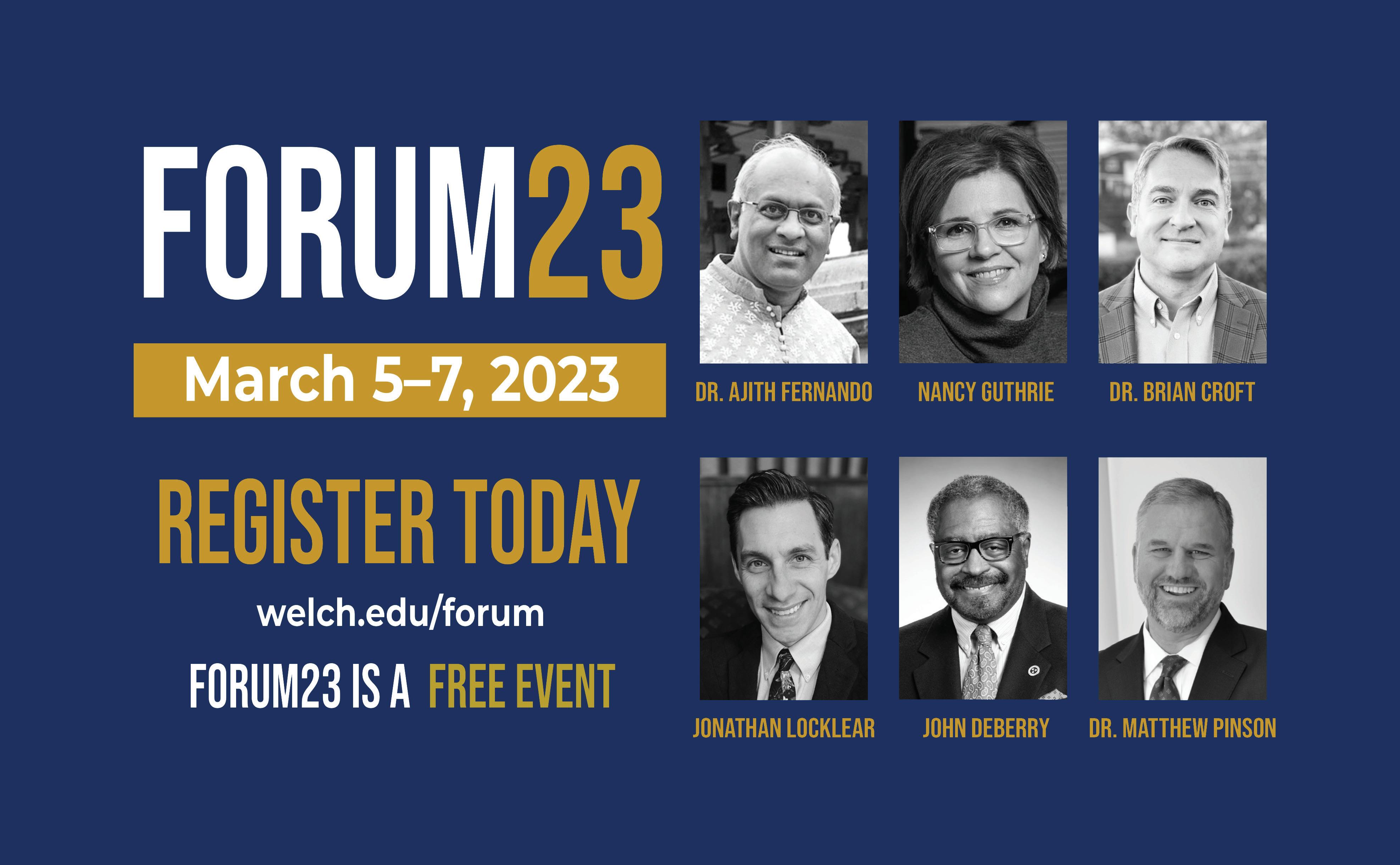
Of course, we should imitate Schaeffer only as he imitated
Christ. The person of Jesus Christ is full of grace and truth (John 1:14). Truth and grace (love) are not opposed to one another or in uneasy tension. If tension existed between truth and love, Christ Himself would be divided. Instead, real love requires speaking truth to unbelief. Truth is always accompanied by deep, abiding love for individuals. If we want to combine truth and love in the way we teach, we look to Jesus. He is our example. Let us not hold back in our teaching. Let us speak the truth of God boldly, as it plays out in all disciplines, with excellence. In doing so, let us seek to anticipate the kinds of questions believers and unbelievers alike honestly ask about the biblical worldview. As we carefully speak the truth in love, let us see people as individuals made in their Creator’s image. In so doing, we can begin truly to teach apologetically.
October 9-11, 2022, students, faculty, staff, and guests gathered to participate in the Welch Missions Conference for the first time since 2018 due to COVID. Each conference speaker addressed the theme “Until the Whole World Hears."
Ron Callaway, former Welch missions professor, opened the conference Sunday evening preaching on “The Mandate of Missions.” Sam McVay, church relations officer at North American Ministries, spoke Monday morning on “The Urgency of Missions,” followed by Instructor of Ministry Jose Rodriguez on Monday evening, who explored the theme “The Church on Mission.” IM Director
Clint Morgan preached Tuesday morning on “The Result of Missions,” while Neil Gilliland, former IM director of mobilization and member care, concluded the conference Tuesday evening with “A Heart for Missions.”
During each service, the songs and Scripture readings focused on God’s heart for His creation and what Christ accomplished to provide salvation for all people. Tuesday morning’s service enjoyed an international emphasis with Scripture read and song sung in Bulgarian, French, Japanese, and Spanish.
Not only were the messages stirring, but eight seminars offered on Monday and Tuesday also gave attendees op -
portunities to hear and see how God is working around the world, and how He wants His people to be involved in His missio Dei, God’s mission of redemption for every people group. Missionaries, pastors, and Christian workers shared opportunities for short-term missions trips, teaching English overseas, teaching in international schools, and ministering to immigrants and international students here in the United States. Sessions also addressed the roles women play in missions, and how to overcome hardships, stress, and sickness in ministry. Seminars and services were well-attended and enjoyed. One student said she appreciated the emphasis on reaching internationals both here and abroad. Another student enjoyed hearing everyone’s impressions of the conference, recalling: “You could see people’s eyes being opened to the importance of missions.”
Throughout history, God has worked to redeem all humanity, and He has used many Christians to help fulfill His plan. Our prayer is God will continue working in the lives of students at Welch College to reach those still unreached with the gospel.
About the Writer: Tim Johnson is program coordinator for Intercultural Studies and a former missionary to Spain with IM, Inc. Learn more: welch.edu and iminc.org.
“Before we let the radical left tear down all the statues of our American founders, we need to read Forlines’ insightful book. Thank God for this book, and for these United States of America!” That’s what Former Arkansas Governor Mike Huckabee said about Secularism and the American Republic, the most recent book released by Welch College Press.
The volume was written by the late F. Leroy Forlines, long-time scholar of theology and culture and professor at Welch College. Forlines poured himself into the volume during the last years of his life. In the book, he argues against the secularist idea of strict church-state separation, opting instead for the reasonable accommodation of church and state.
“We stand desperately in need of a fresh recognition” that America’s founders did not support “secularism as a master ideology superseding all religious assertions and commitments,” writes Wilfred McClay, University of Oklahoma history professor, in his endorsement of Forlines’ book. “We are extremely fortunate to have the benefit of Forlines’ careful and nuanced discussion of the varied meanings of ‘secularism’ as applied to the early Republic, and by extension, to today’s America.”
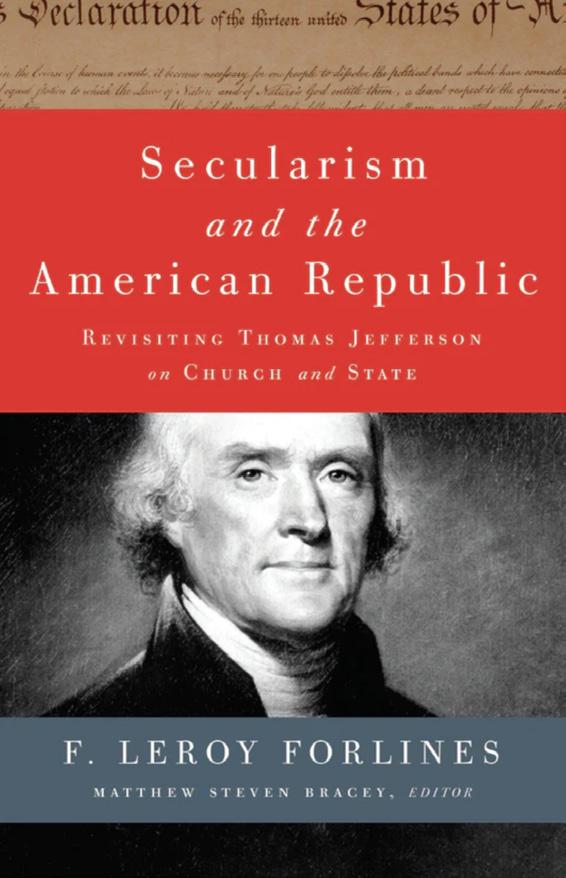
The book was edited by Matthew Steven Bracey, vice provost for academic administration at Welch, who teaches courses in law and culture. “The myth of seventeenth-century American secularism became federally enshrined in the American legal system through the decisions of Everson v. Board of Education and McCollum v. Board of Education,” Bracey notes. “A key piece of evidence the justices in these cases used was a letter penned by Thomas Jefferson in which he referred to a ‘wall’ between church and state. Forlines doesn’t dispute the letter but contends the secularist interpretation of Jefferson’s words is mistaken and the founders supported the accommodation of church and state. Forlines justifies this interpretation based on Jefferson’s writings and example, as well as the history of the movement of secularism and legal history. I’m so glad we can finally make Forlines’ groundbreaking research available.”
Several scholars have lauded the book. For example, Mark Coppenger, retired professor of Christian philosophy and ethics at Southern Baptist Theological Seminary, remarked, “This Forlines volume…is a treasure. I wish I’d had it on hand when I was teaching my church-state relations courses.” People interested in the book may purchase it at welch.edu/welchpress.
Mr. Wayne Spruill, director of Institutional Research at Welch College, died November 9, 2022, in Hendersonville, Tennessee. He was 72 years of age.
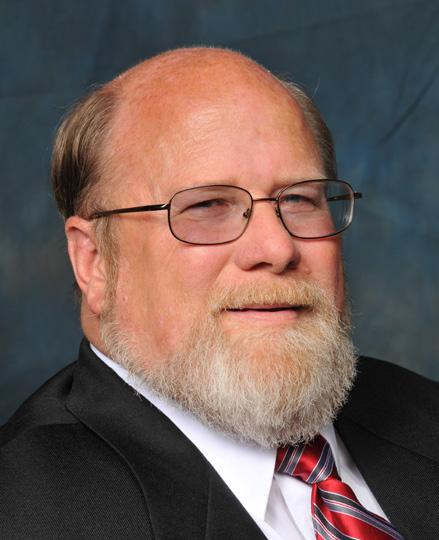
Wayne and his wife, Brenda Sanders Spruill, met while they were students at Welch College, where Wayne was also honored by fellow students to be elected as student body president. Both graduated from Welch in 1972, Wayne with an emphasis in business. Spruill was a businessman and managed several Christian bookstores over the decades, including Randall Bookstore and Zondervan Family Bookstores. Wayne began working at Welch in 2004 as the director of Institutional Research and was instrumental in collecting and categorizing data for accreditation purposes. He remained active in this part-time position at the time of his death. During his time at the college, he also managed the campus bookstore and snackshop and served as advisor to the college yearbook, the Lumen , from 2007-2021.
Welch College appreciates Spruill’s dedicated service and his love for his alma mater. He is survived by his wife Brenda, their four children, Kevin Spruill (NC), Carol Holland (TN), Beth Spruill (TN), Carl Spruill (HI), and ten grandchildren.
Spruill never let his long-term battle with Muscular Dystrophy hinder his work ethic. Since being confined to a wheelchair in the early 2000s, he became known as the “Rolling Deacon.” Perhaps his daughter-in-law Cynthia phrased it best when she said he is now “walking with Jesus.”
A memorial service was held in the Welch College Celorio Hall Auditorium November 19, 2022.

 BY KEN AKERS
BY KEN AKERS
The past year was busy for the Free Will Baptist Disaster Response Team. In December 2021, an outbreak of tornadoes wreaked havoc across several states including Tennessee and Kentucky. The utter destruction of Mayfield, Kentucky, made national news, and most large disaster response groups converged on that town.
Most people did not realize many other locations also sustained severe damage. Areas in and around Bowling Green, Kentucky, and along the Tennessee/Kentucky border were among these hard-hit areas. Master’s Men and associated partners immediately sprang into action. Regional teams from Kentucky, Florida, South Carolina, and Tennessee responded, along with a church from Locust Grove, Oklahoma.
Working with the Oklahoma church and providing Disaster Response Team (DRT) shirts for their team expanded to providing them with a trailer and equipment to be housed in Oklahoma. These willing volunteers have since responded to several disaster locations. In July, a once-in-a-lifetime flood occurred in Eastern Kentucky.
Up to 12 inches of rain fell within a two-hour span. Small towns and communities never before flooded were
wiped out. Once again, DRT responded with teams from Kentucky, Ohio, South Carolina, Florida, and Tennessee. Since that time, volunteers have provided thousands of labor hours, donated thousands of dollars, and delivered truckloads of supplies. Because of this tremendous response, three new Disaster Response Teams were formed: the Ohio Valley Master’s Men DRT; the Kentucky Master’s Men DRT from Lexington, Kentucky; and a DRT from a church in western Virginia. We have been able to provide all these groups with trailers and equipment to use, in addition to their existing equipment.
In the fall, Hurricane Ian arrived, smashing Southwest Florida with category four winds and a powerful storm surge. Master’s Men had DRT representatives on location and additionally worked with local churches to provide relief funding.
As we look back over all the destruction experienced last year, we see a bright spot. In 2022, many men and women were involved in disaster response for the first time. We also received gifts from many who couldn’t go themselves. We formed new regional teams equipped with necessary tools to respond quickly, thanks to generous donations.
While we are saddened by the destruction, and the loss of life in some areas, we rejoice to see the many lives and hearts changed by going and giving. If you or your church want to get involved in DRT, contact ken@nafwb.org and stay connected through the Master’s Men Facebook page.
If you would like a Master’s Men DRT representative to visit your church and explain our ministry, please contact us! And thank you to Free Will Baptist men and women across the nation who have volunteered over the last 17 years through Master’s Men Disaster Response.
Since 2006, Master’s Men has guided Free Will Baptist disaster response, helping the denomination work together to provide relief on a much larger scale. Coordinating with state teams and local volunteers, Master’s Men prepares for disasters before they happen. You can help the DRT in a number of ways:
Become a DRT volunteer.
Provide financial assistance. Donate equipment and supplies. Pray.
While we are saddened by the destruction, and the loss of life in some areas, we rejoice to see the many lives and hearts changed by going and giving.
 BY DEREK ALTOM
BY DEREK ALTOM
For those who may be wondering, 9:00 p.m. (Central) is not the best time for a meeting. I am usually preparing to call it a night, walking through the house to turn off the lights, secure unlocked doors, and set the alarm. However, one Wednesday evening in November 2022 changed this routine. On that night, representatives from all the various D6 international conferences, along with several representatives from Randall House & D6 Family Ministries, came together by Zoom for the first D6 International Directors’ Summit. This truly was a historic event in the life of the Church. I was honored to be part of the meeting. I sat in my home office staring at a screen filled with ministry leaders representing D6 Korea, D6 Singapore, D6 Malaysia, D6 France, D6 Japan, and D6 Asia as well as representatives from D6 United States. At moments, I had to fight back tears as I heard how God is using the message of generational discipleship across the globe. I felt a deep stirring in my spirit when I realized many of these individuals—at
great personal cost—are being used by God to impact families and churches for eternity.
Another wave of emotion flooded my mind and my heart when I considered how these various international conferences were made possible by men and women who see the need to carry the message of generational discipleship to the ends of the earth. Thanks to the heroic financial sacrifices of individuals from across the Free Will Baptist denomination, moms and dads in Korea can get resources in
their native language to lead their families in doing faith at home. Through D6 Asia, ministry leaders from various countries across Asia are learning about the biblical commands in Deuteronomy 6. I could share example after example of how, thanks to D6 Heroes, God is moving around the world in the area of generational discipleship at these D6 conferences. D6 does not send missionaries to these countries, but we do supply resources missionaries and church leaders need.
Our international brothers and sisters need two things from you. First, please pray for them and their conferences. Do not discount the seriousness of this request. Ask God to provide for these conferences and move through
them. Second, would you partner financially with these brothers and sisters and the D6 conferences they lead? Many individuals would love to attend international D6 conferences but cannot because they lack the financial resources.

By going to D6Hero.com and setting up a monthly gift or making a one-time gift to “D6 International,” the message of generational discipleship will continue to spread through these conferences around the world.
About the Author: Derek Altom is director of events and development for Randall House & D6 Family Ministry. Contact him at derek.altom@randallhouse.com. To Learn more about D6, visit D6Family.com.






March 5 Called to Holiness (1 Peter 1:1-25)
March 12 Pursuing Holiness (1 Peter 2:1-17)

March 19 Tested in Suffering (1 Peter 4:1-19)
March 26 Return of Christ (Mark 13:1-27)
April 2 Suffering of Christ (Mark 14:32-65)
April 9 Resurrection of Christ (EASTER) (Mark 15:16-16:8)


April 16 Courageous Faith (Esther 3:1-4:17)
April 23 Standing for What Is Right (Daniel 1:1-21)



April 30 Standing Against Idolatry (Daniel 3:1-30)



May 7 Standing Against Opposition (Daniel 6:1-28)
May 14 Principles of Prayer (Matthew 7:7-11; Romans 8:26-27; John 14:13-14)
May 21 Growing in Grace (2 Peter 1:1-21)




May 28 Living in Hope (2 Peter 3:1-18)

To order, call 800-877-7030 or visit www.d6curriculum.com

Many of these individuals—at great personal cost—are being used by God to impact families and churches for eternity.
During bleak winter days, it always helps me to remember summer is just around the corner. Summertime is my favorite. VBS. Summer camp. A break from school. So many adventures.
Now that our oldest children are in high school, summer also comes with opportunities. Mission trips. Volunteer opportunities. ETEAM. Truth and Peace. All those things are great… and expensive.
It is easy to simply say no to these opportunities because the idea of funding them is terribly daunting. Here are a few tips we have found helpful when fundraising for summer opportunities.



1 2
Don’t expect your church to be the primary source of fundraising for your teen’s summer adventures. We are blessed to be in a church that is incredibly supportive of teens. But remember, churches and church members don’t have unlimited funding.
3













Think outside the box. Does your teen have a special talent? Crafting? Make something to sell. Building? Build something to sell. Cooking? Bake something to sell. Photography? Offer to take family photos on Mother’s Day and Father’s Day weekends for donations.
Do you have access to equipment your teen can safely use? Cutting grass. Weeding flower beds. Power washing sidewalks. All are great ways to turn time into donations.

Timing is everything. Take advantage of times people are already planning to spend money on special treats or gifts. Timing makes your efforts more successful. Bake sales are great anytime, but it is best to bake cakes and pies around Thanksgiving or Easter. Make special treats around Valentine’s Day. Spring cleaning and fall yard cleanup are other great seasonal opportunities. Holidays offer unique opportunities, but taking advantage of those requires advance planning. Everyone is fundraising in April and May. Don’t wait to start in the spring. Plan ahead. Spread the word early.
Plan for your teen to work for the trip(s). Babysitting. Yard work. Cleaning house. Wrapping Christmas gifts. These and other similar activities are great ways to practice serving while generating donations. Even more, working for these opportunities can help build a grateful heart and a good work ethic.


One final note: the first year of fundraising is always the easiest. If your teen decides on a second summer of ETEAM, Truth & Peace, or another similar adventure, expect round two will be more difficult. Plan accordingly. Start earlier. Work harder. The life-changing experiences are definitely worth the effort.
About the Author: Ana Batts is a full-time mother of six children. Her desire is to be an encouragement to other moms striving to raise the next generation to serve God’s Kingdom. She serves alongside her husband Craig, senior pastor at Cross Timbers FWB Church in Nashville, Tennessee. Find more from Ana: shinefwb.com.
Take time to THINK . . .
It is the source of power.
Take time to PLAY . . .
It is the secret of perpetual youth.
Take time to READ . . .
It is the fountain of wisdom.
Take time to PRAY . . .
It is the greatest power on earth.
Take time to LOVE AND BE LOVED . . .
It is a God-given privilege.
Take time to BE FRIENDLY . . .
It is the road to happiness.
Take time to LAUGH . . .
It is the music of the soul.
Take time to GIVE . . .
It is too short a day to be selfish.
Take time to WORK . . .
It is the price of success.
1 cup Crisco, cream together with 3 cups sugar, then 8 eggs. Beat well after each addition. Add 1 tablespoon vanilla. Then add the dry ingredients alternately with 1 cup of milk.
• 3 cups cake flour
• ½ teaspoon baking powder
• ½ teaspoon salt
• 4 tablespoons cocoa
Sift together and add 1 cup chopped nut meats to this mixture. Pour into tube pan lined with waxed paper and bake in moderate oven until done.
• Fried chicken
• Creamed Style Corn
• Fried Okra
• Sliced Tomatoes
• Corn Bread
• Chocolate Pound Cake—Ice Cream
• Iced Tea
About the Author: Mrs. O.B. Everson, Colquitt, Georgia. Wife of Deacon O.B. Everson; mother of four children. Christian, 22 years. Favorite verse, Matthew 6:34.
Excerpt from Bible and Mixing Bowl in a Woman’s World, published in 1962. The net proceeds from the sale of this book helped fund the Memorial Student Loan Fund, which later became the Dr. Mary R. Wisehart Student Scholarship.
The co-editors were Mrs. Roy O’Donnell (Mt. Olive, North Carolina) and Mrs. Eunice Edwards (Nashville, Tennessee). Published by WNAC. Each page of the book had two recipes, a meal plan, a devotional or poem, and an author’s biography.
What is your community like, and what is the implication for your ministry? More than 7% of all Free Will Baptist churches in the National Association have completed a Know Your Community (KYC) report on their neighborhoods. These reports are provided in partnership with Church Answers and consist of U.S. Census Data and ESRI (Environmental System Research Institute) information. This sampling of churches provides a picture of the neighborhoods where Free Will Baptist churches are located and the opportunities available to our churches.
Over 73% of all U.S. counties experienced population decline last year.1 However, 75% of the communities surrounding the churches that completed the KYC report grew. It is unclear whether this is a result of sampling bias (perhaps churches in growing communities are more likely to participate in KYC). Regardless, a significant percentage of Free Will Baptist churches are located in growing communities. The world is coming to our neighborhoods!
The fields are white and ready for harvest. Though many of our churches are in the “Bible Belt,” most have significant numbers of unchurched people. On average, when asked about attendance at religious services (e.g., church, mass, mosque, synagogue), 33.63% replied with “Disagree Completely.” The graph at right is typical.
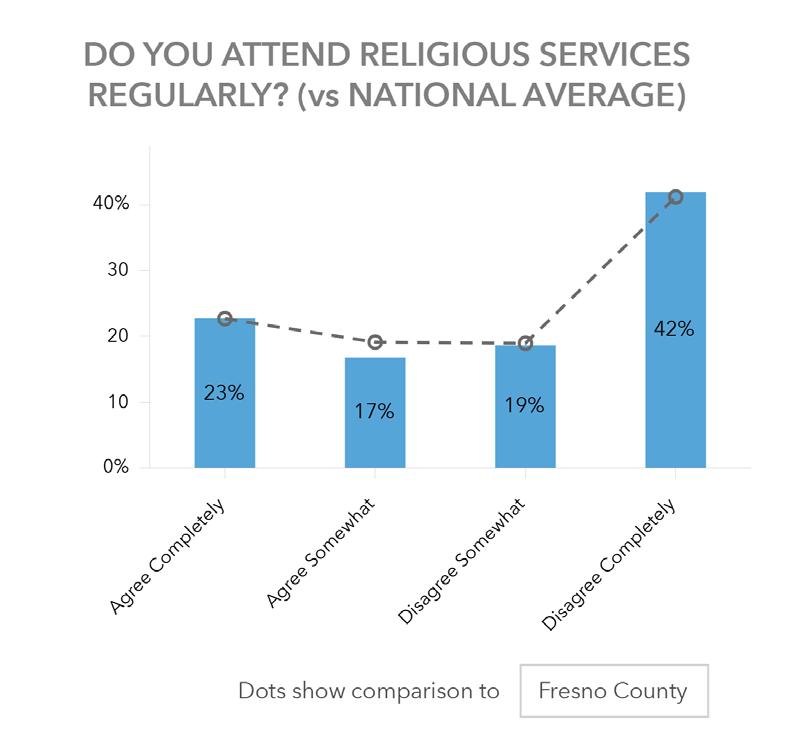
The spiritual, physical, financial, and emotional needs of our communities are great. We will report on only one measure—widows. Free Will Baptist churches average 8,111 widows in their communities. This number is expected to increase, since women aged 60-64 are the most frequently occurring group (24% of the churches). This and other needs identified in individual communities provide ministry opportunities.
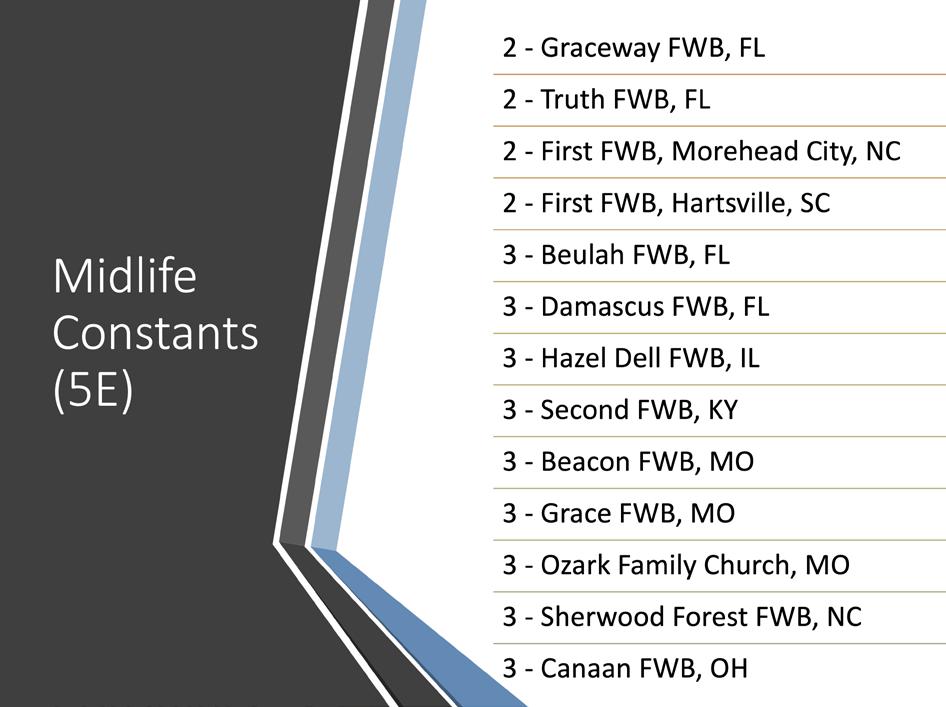
Your community may be unlike the overall U.S. As seen in the chart at right, the age profile of one church’s community is compared to the U.S. population. This community is much older on average. During the feedback session with this church, they indicated they had been concerned because they had more older people than younger people in the church. In actuality, the church simply reflected the community around it.
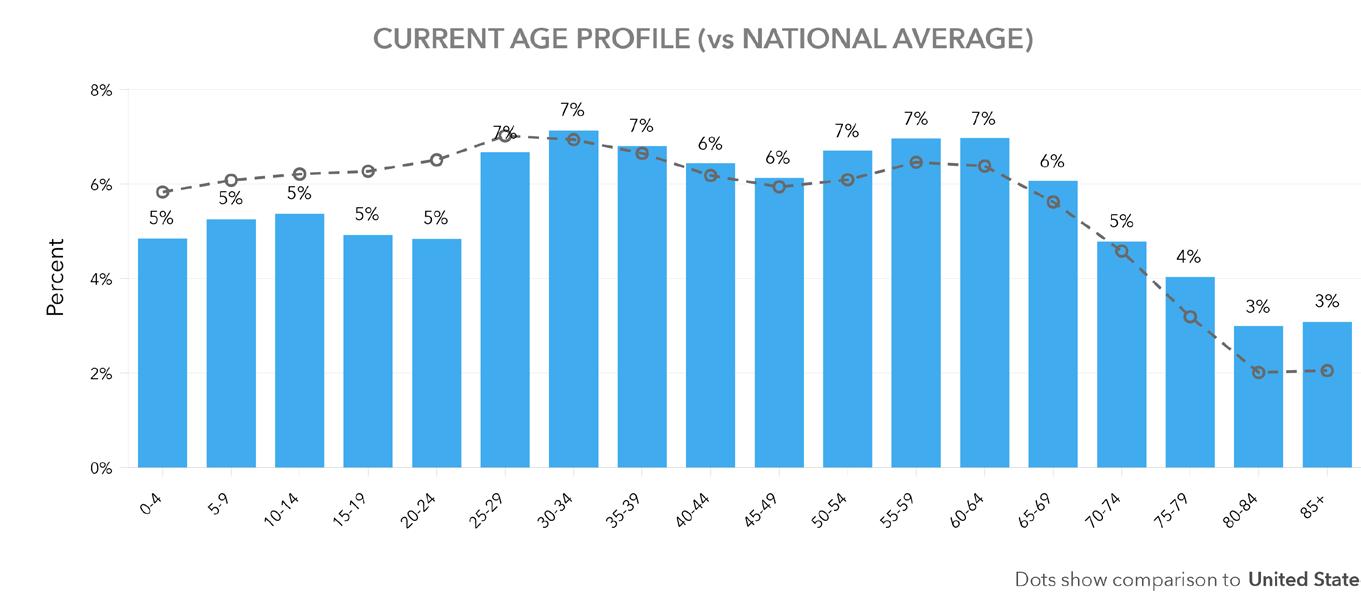

When examining a particular community, it becomes clear every community is unique. Therefore, tactics or strategies from one setting may or may not work in another. Using another church’s strategies would be like a physician prescribing medication without conducting an examination. Repeatedly, churches find more in common with churches from other states or regions (or even the opposite coast) than with other churches in their own states. To the left is an example based on a Michigan church. Note that churches most similar to this congregation are located in other states.
KYC reports typically focus on the top 20 segments in each community. Note that Church A at right only has five groups, and one group (Economic Bedrock) consists of 70% of the community. This is a very monolithic community. In fact, each tapestry segment is native to this community. On the other hand, the profile of Church B shows 20 segments covering 83.7% of the church’s community population. Further, you might say many of these segments are not native to the community and can be more challenging to reach. Interventions utilized to reach the

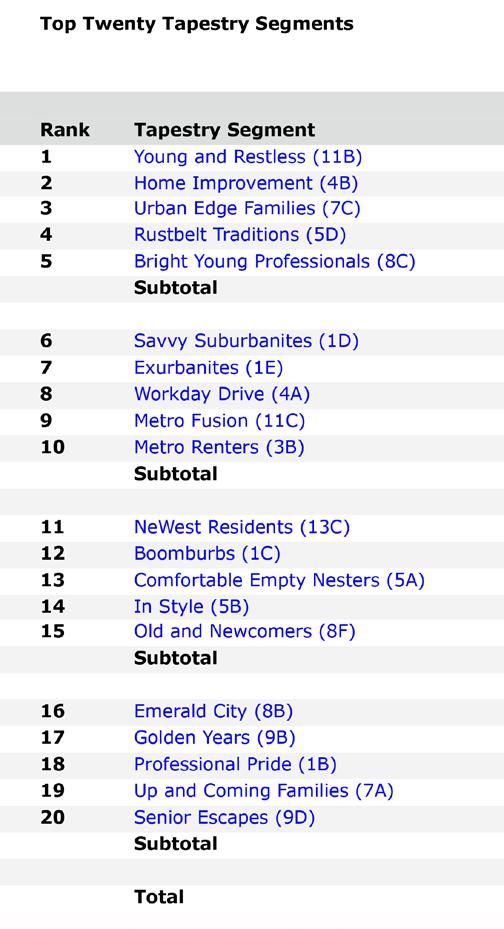
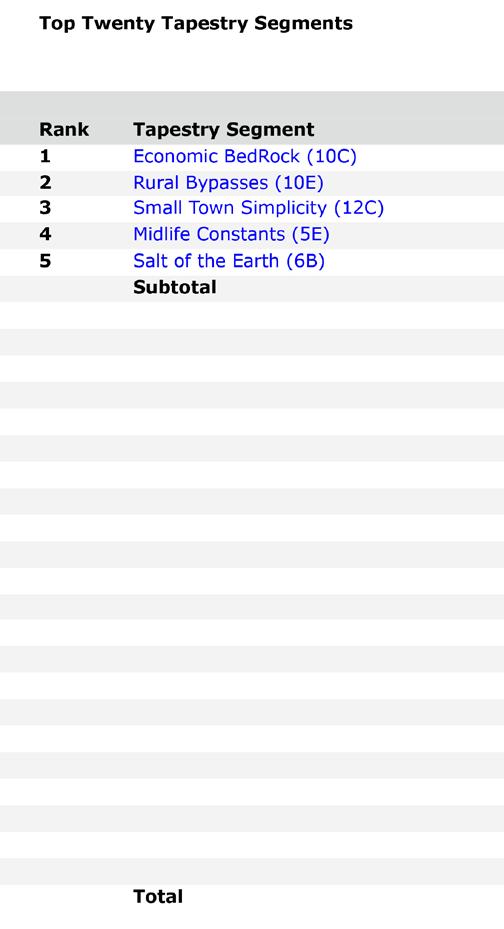
Church A community might seem foreign to the Church B community. Further, a minister accustomed to ministering at Church A would find great challenges if he moved to Church B and vice versa. Context is critical and must be considered to minister effectively.
The tapestry segments listed previously are psychographic groups. Although the demographics (age, gender, income, language, ethnicity, marital, and ability status) of each community are described in the KYC report, psychographics may be more important.2 Psychographics involve the study of activities, attitudes, personalities, and values of individuals and cross-ethnic groups. According to KYC, there are 65 psychographic groups in the U.S.
When we learn about psychographic groups, we follow the teachings of 1 Corinthians 9 by enabling our churches to be intentional about reaching each group. For example, if we learn about the activities and behaviors of a group, we know where to find them and areas in which we can engage them.
Psychographic groups or tapestry segments are not necessarily confined to one region. There are 16 tapestry segments of which 50 or more Free Will Baptist churches have high percentages in their communities (see graph on page 58). Free Will Baptists are effective in reaching some of these groups (i.e., Heartland Communities, Southern Satellites, Green Acres). On the other hand, we struggle to reach other groups (i.e., Bright Young Professionals, In Style, Old and Newcomers). However, if we have 50 or more churches with a significant number of these groups, we must try to seek them.
At left is data for the psychographic group Metro Fusion, a very diverse group. Every psychographic group has a diversity index. Metro Fusion is 84.6. The higher the number, the more diverse the group. As a church, if you reach the Metro Fusion psychographic group, you will reach people from diverse ethnic groups: Hispanics (34.2%), Blacks (30.8%), and whites (42.7%). Rather than thinking, “I need to reach Hispanics” (a diverse rather than a monolithic group), it is likely more effective to focus on psychographics.
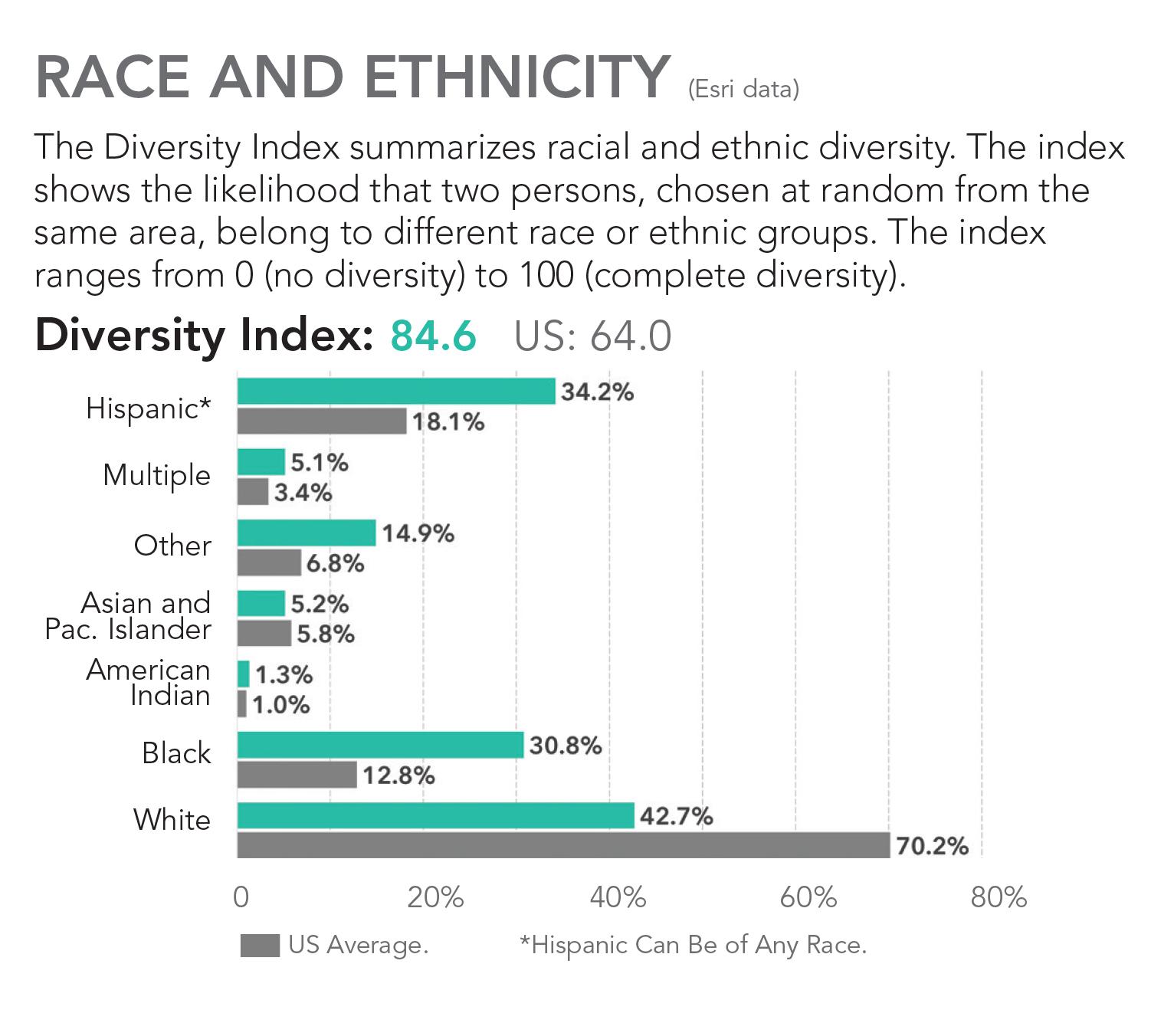
Psychographic information informs us about interests we share with the group and various means we can use to reach them.
2 A. Samuel. Psychographics Are Just as Important for Marketers as Demographics (March 11, 2016). Harvard Business Review. Accessed: https://hbr.org/2016/03/psychographics-are-just-asimportant-for-marketers-as-demographics

Growing Together. It can be difficult to use the KYC information to reach unfamiliar groups. One way we are working to reach these groups more effectively is through Growing Together: Know Your Community Subculture Discussions. We have working groups for Old and New Comers, Traditional Living, College Towns, Comfortable Empty Nesters, Savvy Suburbanites, and In Style. In these groups, churches discuss ways to reach these groups and work to create templates of outreach activities for each group.
Additionally, each church that participates in KYC receives Excel files allowing them to identify churches with similar profiles. This allows churches to work together toward a common goal. We also provide meetings with churches
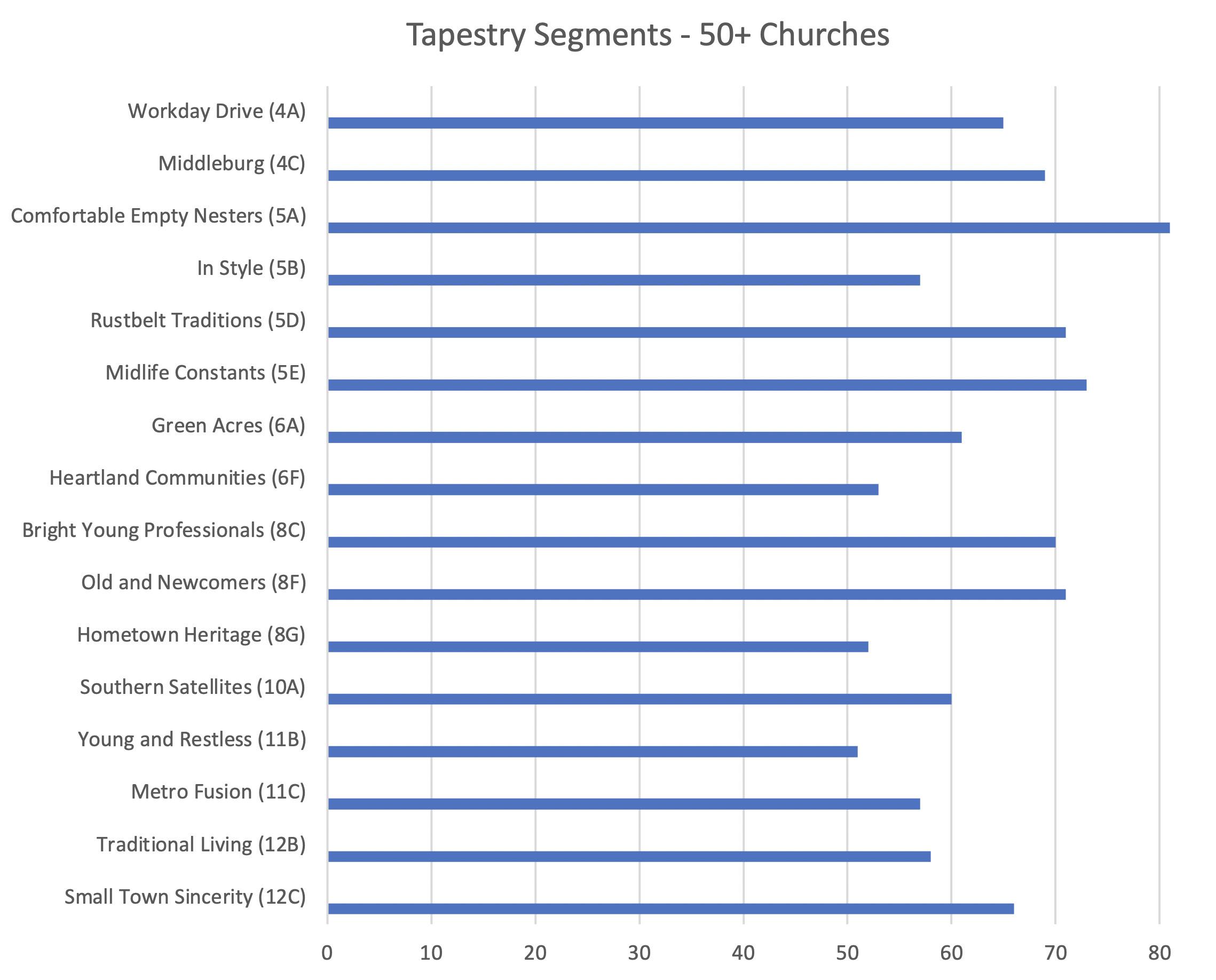
to discuss their KYC report results together to identify actions they can put into practice.
Information without action is useless. We encourage all our churches to get to know their communities and take the necessary steps to reach them. Currently, 12 Free Will Baptist churches are part of a pilot program with Church Answers to develop The Hope Initiative, a prayer and outreach strategy churches can use to reach their communities.
The Hope Initiative focuses on praying for and reaching the church’s community. We hope our churches use this vital information about their communities to pray more for them more specifically and to reach them with the gospel more effectively. To learn about any of these resources, call us at 877-767-7659, visit nafwb.org/know, or email questions@nafwb.org.
NAFWB | V3 | Raleigh, North Carolina | July 16-19
One Form Per Person | Register Online: www.nafwb.org | Name Badges Required for All Convention Events
National Association (All voting delegates must be members in good standing of a FWB church.)
Voting Delegates
❏ National Board/Commission Member
❏ Ordained Minister
❏ Ordained Deacon
❏ State Delegate (Authorization Required)
❏ Local Church Delegate (Delegate Card Required)
Non-Voting
❏ Attendee (All Ages, Including Infants and Toddlers)
Preschool
❏ Ages 3-5, Attending Preschool Worship - $25 ($35 onsite)
❏ Ages 0-5, Not Attending Preschool Worship - NO FEE
Students: $25
Any student or competitor* attending any CTS competition or event MUST pay $25 V3 conference fee ($35 onsite).
❏ Grades K-3
❏ Grades 4-6
❏ Grades 7-12
*Competitors must pay this V3 conference fee in addition to CTS competition fees already paid.
College Age | Adults: $20
Adults attending any competition or event MUST pay $20.
❏ Adult Attendee
V3 Event: Fun With Forrest Qty_______ x $10 = _______
Tuesday, July 18, 9:00 pm ($15 onsite/at the door)
V3 Information: 800-877-7030 | www.verticalthree.com
Tickets (More information available at a later date)
WNAC Laughter and Latté
Monday, July 17, 8:30 p.m.
Welch Alumni & Friends Luncheon
Wednesday, July 19, noon
National Association Info: 877-767-7659 | www.nafwb.org
Register April 3 – June 16 | No Refunds After June 16
Payment Options:
+ Check (Payable to FWB Convention)
+ Visa, Discover, or MasterCard only (both debit and credit cards accepted)
Card # ________________________________________________________________
Card Holder___________________________________________ Exp_____/_______
Signature ______________________________________________________________
NAFWB Questions: 877-767-7659 | convention@nafwb.org
Return to: Convention Registration PO Box 5002 Antioch, TN 37011 / FAX: 615-731-0771
2023 NATIONAL CONVENTION
Please note: biographical information only included for new board and commission nominees.
Board of Retirement and Insurance (2029)
Travis Moots (NC)
William Smith (GA)
Joshua Chapman (MO)
Travis Moots has served at Hilltop FWB Church and Hilltop Christian School (HCS) in Fuquay-Varina, North Carolina, for more than two decades. Currently, he serves as associate pastor of the church and principal of the school.
William Smith has served as executive secretary/treasurer of the Georgia State Association of Free Will Baptists for over 25 years. Also in 2023, he will conclude more than two decades as assistant moderator of the National Association.
Joshua Chapman is a church planter to Rolla, Missouri, serving under the Missouri Free Will Baptist Missions Board. The church planting team has established Mosaic Church, a local congregation focused on reaching the large international population studying and working in the Rolla community. Fundraising and partnerships with other ministry organizations have been essential in Joshua’s role as he oversees finances and planning, communication with partners, and teaching.
Board of FWB Foundation (2029)
Jonathan Locklear (MI)
Melissa Haralson (AR)
Bob Thompson (OK)
Jonathan Locklear is the associate pastor at Woodhaven FWB Church in Woodhaven, Michigan, where he has ministered for 15 years. He currently supports the Foundation by hosting estate planning seminars. Although a younger minister, he is heavily involved in denominational work and understands the importance of the work of Free Will Baptist Foundation.
Board of North American Ministries (2029)
Josh Bush (KS)
Josh Baer (NC)
David Sexton (VA)
Josh Bush became pastor of Cross Point Church in Wichita, Kansas, 16 years ago. Cross Point had a congregation of seven and a building in disrepair. After the church began to grow
numerically, Josh led the congregation to purchase a church campus in a struggling area of Wichita. The church has since grown to become one of the leading Free Will Baptist churches in Kansas. Josh supports and promotes North American Ministries along with other denominational ministries. He has the gift of encouragement and uses that gift to help other churches and pastors.
Music Commission (2026)
Sam Harris (NC)
Sam Harris has been music minister at Parkers Chapel FWB Church in Greenville, North Carolina, for 32 years. He has worked with the Music Commission since 2015 to plan music for the National Convention. He also has directed the Convention Choir since 2015.
Music Commission (2028)
Daniel Webster (TN)
Daniel Webster has served in music ministry 22 years at four Free Will Baptist churches. He currently serves as the music and worship director at Immanuel FWB Church in Gallatin, Tennessee. Daniel also teaches worship and music classes at Welch College.
Historical Commission (2028)
David Crowe (TN)
Media Commission (2028)
Stephen Lopes (TN)
Commission for Theological Integrity (2028)
Matt Pinson (TN)
Executive Committee (2026)
Stan Bunch (MO)
Wayne Hale (Mid-Atlantic)
Daniel Edwards (IN)
General Officers of the Executive Committee (2027)
Randy Bryant (FL) – Clerk
Jackson Watts (MO) – Assistant Moderator
Jackson Watts began pastoring Grace FWB Church in Arnold, Missouri, in August 2011, after ministering four
years in North Carolina. Jackson grew up in South Carolina and was called to preach shortly after becoming a student at Welch College, where he studied English and pastoral ministry. Ordained shortly after graduation from Welch, Jackson served from 2007-2011 as the minister of education at Tippett’s Chapel in Clayton, North Carolina. While there, he earned graduate degrees from Southeastern Baptist Theo -
logical Seminary and Duke Divinity School. He has since completed a Ph.D. from Concordia Seminary. A member of the Commission for Theological Integrity, he has published two books and written extensively for FWBTheology.com and the Helwys Society Forum (TheHSF.com).
*The following boards do not elect members in 2023: IM, Inc., Randall House, Welch College, and WNAC.
Nashville, TN— December 5-6, 256 pastors and ministry leaders from 25 states and a Canadian province gathered at Sonesta Nashville Airport for one of the largest Leadership Conferences in the meeting’s history. Attendees enjoyed two days packed with intense training, inspiration, fellowship, and business. Keynote sessions featured bestselling author and pastor Robby Gallaty who explored the theme “DiscipleShift.”
During Monday’s opening session, Gallaty challenged leaders to care for their own discipleship needs in preparation to disciple others. He pointed listeners back to the basics of discipleship: spending time alone with God and His Word, seeking silence and solitude despite busy schedules that make this feel impossible. “Every great movement of God starts by not moving,” he concluded.
On Tuesday, Gallaty tackled five common myths that can become barriers to effective discipleship in the church: 1) activity = transformation; 2) ministry excellence = excellent ministry; 3) teaching = training; 4) filling spots = empowering people; 5) church impact = ministry ownership.
To remove these barriers, Gallaty urged church leaders to become hero makers who make the church a training center to empower individual members to embrace a discipleship plan they own.
During Q&A following each keynote session, Gallaty answered difficult and challenging questions about being a disciple and making disciples. His honest (sometimes blunt) answers were perhaps as helpful to listeners as his messages.
In addition to keynote sessions, 14 seminar speakers delivered timely sessions addressing a wide range of discipleship topics from strategies for discipleship to discipleship across generations, the role of the pastor’s wife in discipleship, cross-cultural effectiveness in discipleship, and more.
The seminar program included new tracks especially for women and Spanish speakers, leading to high attendance numbers for both groups, including 42 women, the largest number ever to attend the meeting.
Conference Director Ryan Lewis reflected, “In a year where the conference theme was ‘DiscipleShift,’ attendees were challenged both personally and practically to change their thinking in how they reach those within their circle of influence and help them grow in the faith.”
The two-day conference featured much more than strategy and training. Ballrooms buzzed with animated conversation during banquet-styled meals, and in-depth discussions continued long after meals and sessions concluded, spilling over into the hallways and common areas of the hotel. Various boards and committees also met in conjunction with the conference, including the Board of Retirement; the Executive Committee; Free Will Baptist Foundation; IM, Inc.; North American Ministries; Randall House; Welch College; WNAC; and state leaders.
Tennessee Pastor Matt Honeycutt expressed enthusiasm about his experience: “I thoroughly enjoy and look forward to the Leadership Conference each year. From seeing familiar faces and meeting new ones, to gaining insights in the breakout sessions and hearing keynote speakers, the Leadership Conference fills an important need.”
Executive Secretary Eddie Moody announced December 4-5, 2023, as the dates for the next meeting. Author and veteran pastor and church planter Mark Clifton will be featured as the speaker, exploring the theme, “Reclaiming Glory: Hope for Our Churches.”
Visit www.nafwb.org/leader throughout the year for more updates regarding the 2023 conference.
I walked through the entrance at Calvary Chapel in Buffalo, Missouri, October 16, 2022, and was cheerfully greeted—even though the church had no electrical power. “We will just have to adapt,” someone told me. The Calvary Chapel team sprang into action preparing for the first service. Though it was dark, the service went off without a hitch. Afterward, the group celebrated their pastors with a brunch outside, followed by another service. Between services, church members hooked up a generator so mics and instruments could be used. That memorable morning provided me a glimpse into the culture of Calvary Chapel.
Calvary Chapel underwent a major transition in January 2022 when Dr. Douglas Earls passed the senior pastor baton to Mark Elliott after 33 years. Often, such transitions are marked by a loss of momentum, division, and even occasional coups to seize the pulpit. However, Calvary Chapel has continued to grow, far outpacing the growth of its small town of 3,318 people. It is as if the transition and COVID never happened for this resilient church.
The smooth transition didn’t just happen; it was intentional. Dr. Earls is a well-known trainer, leading Missouri’s Palmer Institute for some time. This is evident at Calvary Chapel, where there is a culture of training and discipleship. When Dr. Earls prepared to retire, the church did not need to look for his replacement. The next pastor was sitting in a pew. Not that Mark Elliot was doing much sitting! He had been extremely active, serving two decades as youth pastor, and was an active member in the church community before that. Interestingly, every staff member at Calvary Chapel has come out of Calvary Chapel.
Training or discipleship is not limited to pastors. Throughout Calvary Chapel, there is an understanding of spiritual gifting and the ways a person’s gifts can be used in ministry. This ranges from children to
seniors. (Be sure to watch the Better Together Podcast with Dr. Earls on using your gifts in retirement.) This culture of training has been beneficial to the church, where it appears people are working together, focused on reaching their community with the gospel. Their community has benefited because the members are actively serving.
I am convinced the ongoing pastor, deacon, and volunteer shortage in the U.S. church is tied to a lack of training. My assumption is based upon data for Free Will Baptist churches. Our Sunday Schools and small groups have been in decline since 1975, and we have experienced a 58% reduction since 2000. Eventually, that lack of training begins to show up.
Training and discipleship take time. But the emphasis is necessary; you can’t take shortcuts in training pastors, deacons, and volunteers. For more than three decades, Calvary Chapel has invested in others, and it pays off.
What I experienced on October 16, 2022, was years in the making. Ample volunteers were unperturbed by a problem and smoothly addressed it. Church members took an active role in making a difficult situation better, and competent and committed leaders stayed focused on reaching their community with the gospel despite circumstances. It was a great day—one years in the making.
So remember, our next pastors, deacons, and volunteers are sitting in our pews, if we invest the time to train them.
Eddie Moody Executive Secretary, National Association of Free Will Baptists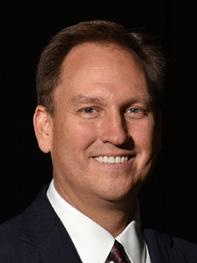

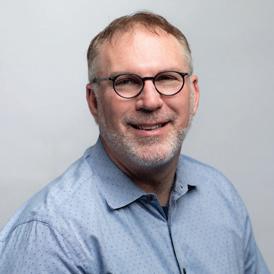
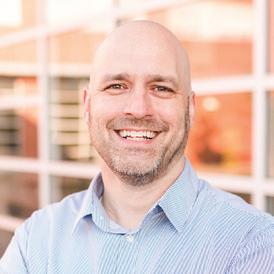


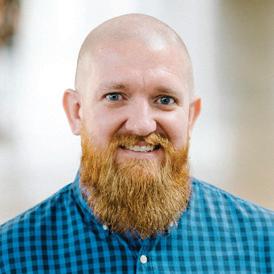
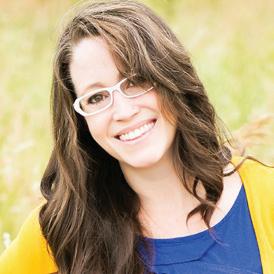
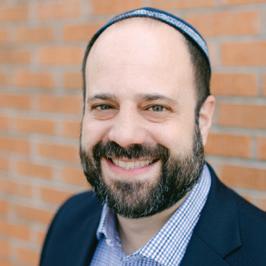

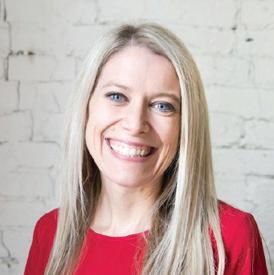
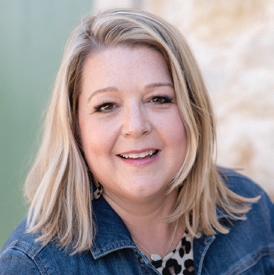


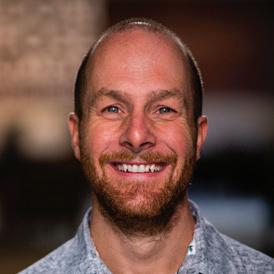

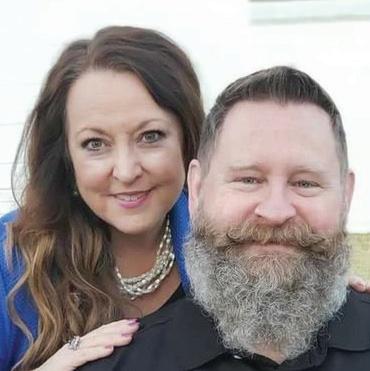

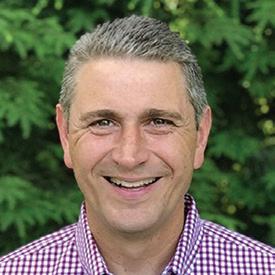

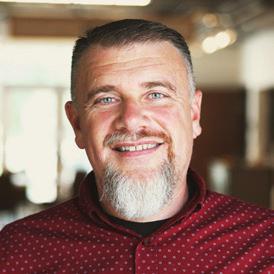



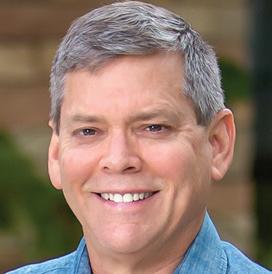
 CHRYSTAL EVANS HURST RON HUNTER
ADAM GRIFFIN
KELLY MINTER KIM HUDSON
MATT MORGAN
HILLARY MORGAN FERRER
RABBI JACOB ROSENBERG BRIAN HAYNES
MARIANNE HOWARD MICHELLE NIETERT SANDRA PEOPLES
BECKY SPARKS
TOMMY & JESSICA SWINDOL
MATT ADAMS
TAMMY DAUGHTRY
MELISSA MCDONALD ROB RIENOW
ALISA CHILDERS
TIMOTHY PAUL JONES
ARLENE PELLICANE
BRAD RHOADS
RICHARD ROSS
CHRYSTAL EVANS HURST RON HUNTER
ADAM GRIFFIN
KELLY MINTER KIM HUDSON
MATT MORGAN
HILLARY MORGAN FERRER
RABBI JACOB ROSENBERG BRIAN HAYNES
MARIANNE HOWARD MICHELLE NIETERT SANDRA PEOPLES
BECKY SPARKS
TOMMY & JESSICA SWINDOL
MATT ADAMS
TAMMY DAUGHTRY
MELISSA MCDONALD ROB RIENOW
ALISA CHILDERS
TIMOTHY PAUL JONES
ARLENE PELLICANE
BRAD RHOADS
RICHARD ROSS
